Beyond Auburn Magazine
Winter 2024: Catalytic Engagement: JoEllen Sefton Award for Excellence in Faculty Outreach
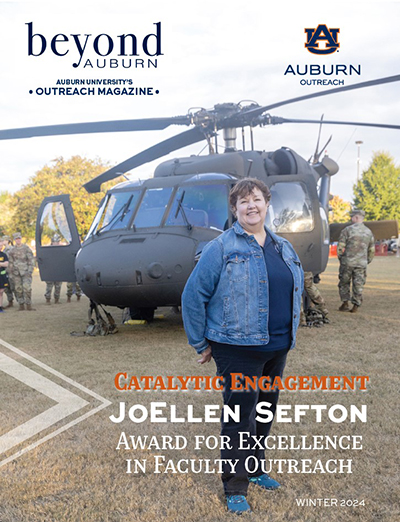
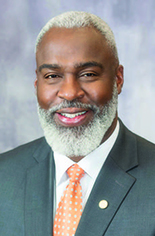
One of the most important – and inspiring – responsibilities of the Office of the Vice President for University Outreach is to recognize the outstanding achievements of our Auburn faculty and staff for their dedicated contributions in outreach engagement. Each year, we recognize and honor these exemplary individuals through two award programs, the Royrickers Cook Endowed Engagement Award and the Auburn University Award for Excellence in Faculty Outreach.
My namesake Endowed Engagement Award is presented annually to one faculty or staff member who has shown an ongoing and purposeful commitment to implementing outreach and public service, and who understands civic and community engagement, interpersonal relationships and serving the underserved. This year’s recipient, Sean Forbes, associate professor of Educational Psychology, leads the Opelika Grows (O Grows) initiative. O Grows fosters sustainable relationships with those in need, encouraging students and volunteers to connect with each other and the greater Auburn-Opelika community by cultivating food through its community garden. As College of Education Dean Jeffrey Fairbrother noted in his nomination of Sean Forbes, “The O Grows program exemplifies the university’s commitment to community partnership and outreach by addressing issues of food insecurity in the Opelika area.” Indeed, Dr. Forbes’ dynamic leadership of O Grows is truly an exemplar of impactful outreach engagement.
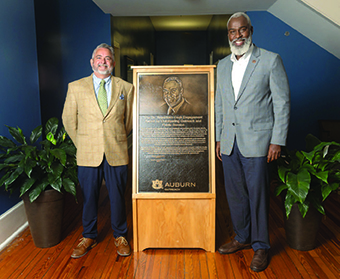 Sean Forbes, recognized for his outstanding community work through Opelika Grows (O Grows), proudly receives the prestigious Royrickers Cook Endowed Engagement Award. Pictured with Vice President Royrickers Cook, Forbes stands beside the bronze plaque that now bears his name. O Grows exemplifies Auburn’s pillars of research, instruction, and outreach. It features a year-round community garden, a state-certified farmers market, youth and adult educational programs, and demonstration workshops.
Sean Forbes, recognized for his outstanding community work through Opelika Grows (O Grows), proudly receives the prestigious Royrickers Cook Endowed Engagement Award. Pictured with Vice President Royrickers Cook, Forbes stands beside the bronze plaque that now bears his name. O Grows exemplifies Auburn’s pillars of research, instruction, and outreach. It features a year-round community garden, a state-certified farmers market, youth and adult educational programs, and demonstration workshops.
Our second recognition, the Award for Excellence in Faculty Outreach, is part of the university’s annual Faculty Awards Program which celebrates outstanding achievements and contributions across various categories of exemplary scholarly activity and service. The recipient of the Award for Excellence this year is JoEllen Sefton, professor in the School of Kinesiology and director of the Warrior Research Center. Dr. Sefton’s outreach and community-engaged scholarship focuses on improving performance, enhancing health and wellness, and reducing injury among “tactical athletes,” including military personnel, police, firefighters and first responders. Dr. Sefton’s distinguished academic, research and outreach engagement has had a positive and lasting impact on thousands of military, tactical athletes and students to date, which deservedly establishes her as an exemplar of faculty outreach and community engagement.
I am proud that University Outreach has long recognized engagement excellence, going back to 1988 with the establishment of the Award for Excellence in Faculty Outreach. Notably, the very first recipient of the Award for Excellence was Dr. Leah Rawls Atkins, founding director of the Caroline Marshall Draughon Center for the Arts & Humanities. Dr. Atkins recently passed away at age 89, and it is timely as we remember her and honor her accomplishments; we also celebrate that she, too, is an exemplar of outreach engagement.
This issue of Beyond Auburn is dedicated to these outstanding award recipients and honored exemplars of impactful outreach. Their ongoing work and legacies demonstrate that by working together our engagement makes a difference in so many lives across our state and well beyond.
Join me in making that difference!
War Eagle and best regards,
Royrickers Cook, Ph.D.
Vice President for University Outreach and Associate Provost
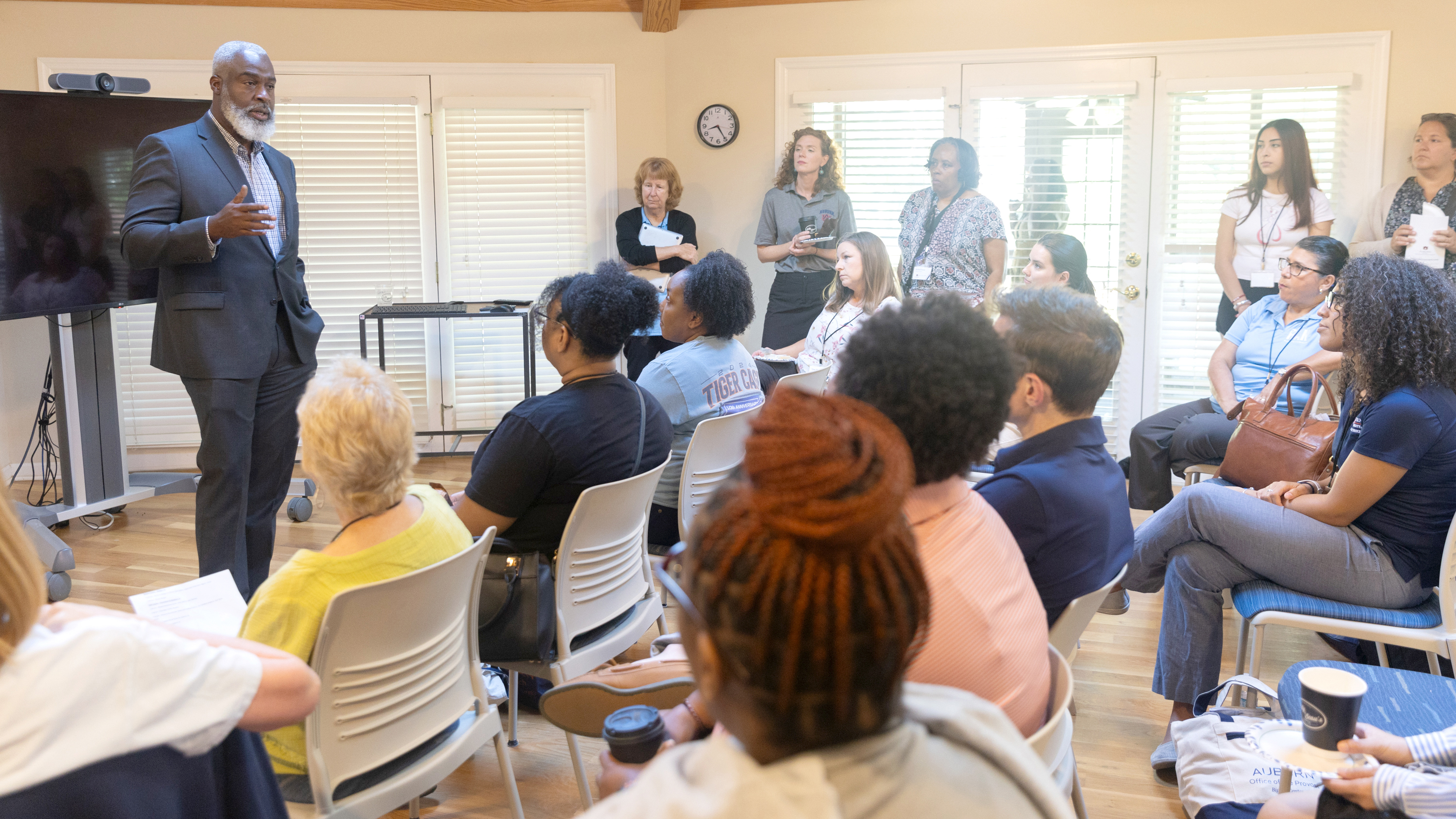 Cook addresses the Auburn Across Alabama - faculty experience cohort before they leave to visit locations in the Alabama Black Belt to explore opportunities to collaborate with community leaders to address issues of concern.
Cook addresses the Auburn Across Alabama - faculty experience cohort before they leave to visit locations in the Alabama Black Belt to explore opportunities to collaborate with community leaders to address issues of concern.
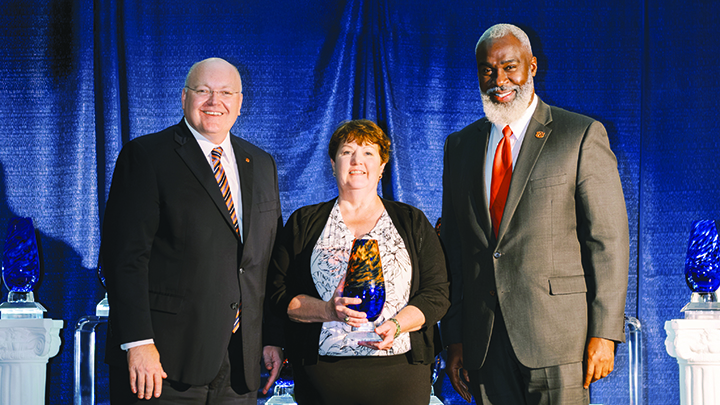 JoEllen Sefton (center) receives the 2024 Award for Excellence in Faculty Outreach. Pictured with AU President Christopher Roberts and Royrickers Cook, Vice President for University Outreach, Sefton’s work is having a profound and lasting impact on the military, local public servants, tactical athletes and students. Sefton serves as an exemplar of Auburn’s commitment to outreach and community engagement.
JoEllen Sefton (center) receives the 2024 Award for Excellence in Faculty Outreach. Pictured with AU President Christopher Roberts and Royrickers Cook, Vice President for University Outreach, Sefton’s work is having a profound and lasting impact on the military, local public servants, tactical athletes and students. Sefton serves as an exemplar of Auburn’s commitment to outreach and community engagement.
Catalytic Engagement - Taking care of tactical athletes
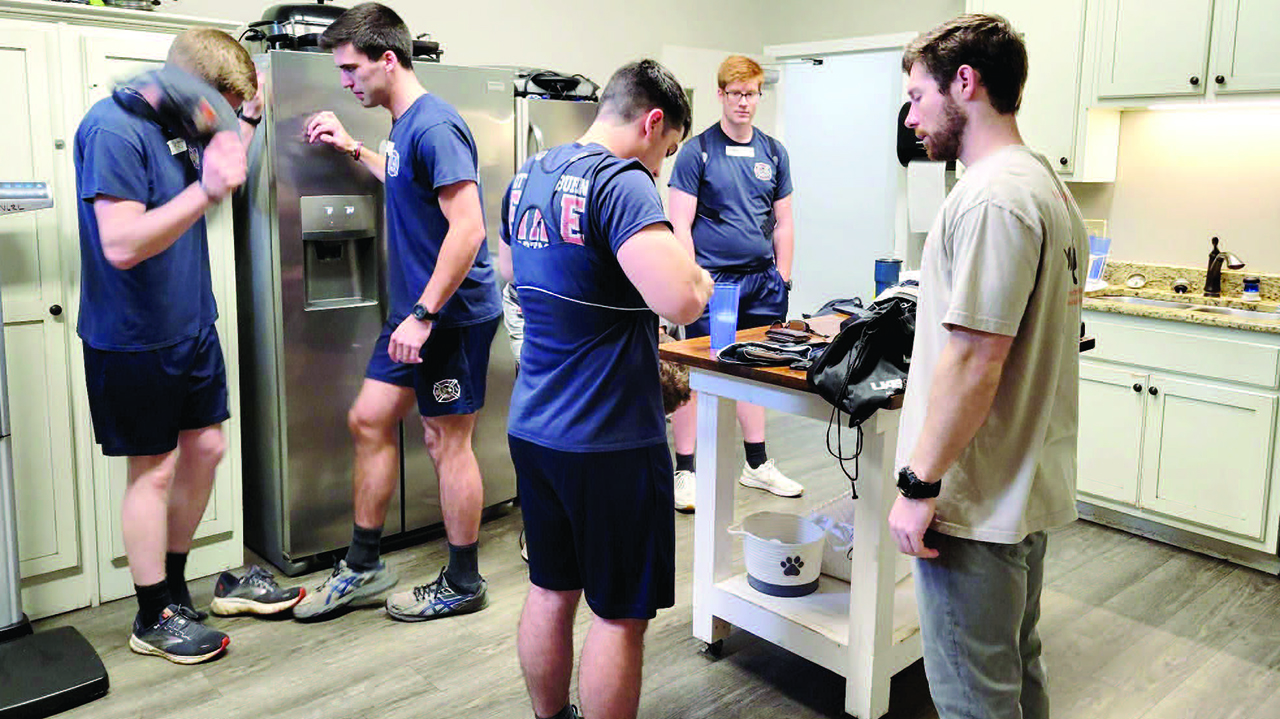 Members of the Warrior Research Center help Auburn firefighters put on equipment that will be used during data collection.
Members of the Warrior Research Center help Auburn firefighters put on equipment that will be used during data collection.
In 2008, JoEllen Sefton received a phone call from U.S. Army Major Todd Burkhardt at Fort Benning that went a little bit like this:
“Dr. Sefton, the commander of our training unit, tells me we have way too many injuries, and we need to fix it. Can you help?”
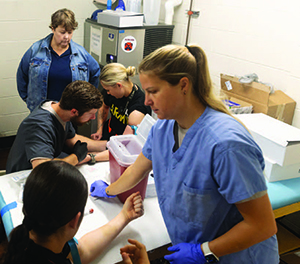 Members of the Warrior Research Center conduct blood draws for a research project.
Members of the Warrior Research Center conduct blood draws for a research project.
Sefton’s response was immediate, methodical and effective. A leading expert in athletic training and injury prevention at Auburn University’s School of Kinesiology, Sefton developed what would become the Warrior Athletic Training Program, embedding graduate student athletic trainers within the units at Fort Benning and implementing evidence-based interventions to reduce musculoskeletal injuries and improve physical readiness in training units.
The success of that program ignited Sefton’s research and changed the trajectory of health for tactical athletes. Recently named the recipient of the 2024 Award for Excellence in Faculty Outreach, Sefton has spent the past two decades spearheading research and outreach to improve performance while reducing injury for military, police, firefighters and first responders.
“All the work that we do here is to solve a problem and to help people,” Sefton said. “Our scope is tactical athletes and how to keep them safe and healthy. If it’s not going to make a difference in somebody’s life, then we don’t spend our time on it.”
Athletic training lays foundation for helping warriors
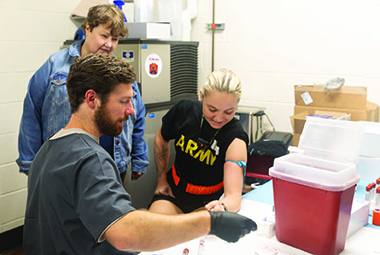 JoEllen Sefton looks on as Cole Bordonie conducts a lab blood draw on a member of the military.
JoEllen Sefton looks on as Cole Bordonie conducts a lab blood draw on a member of the military.
When Sefton received that call in 2008, she was running the athletic training master’s program in Auburn’s College of Education. As a Navy spouse, she knew a little about the military, but not a lot about the Army.
“The first thing I did was travel to Fort Benning to view how they trained their soldiers,” she said. “I could immediately see things that needed to change, and we started talking about how I could help his battalion.”
Many trainees come to the Army without the level of physical fitness required for the job. Sefton realized that no one had ever recorded data on the military training programs or the population of trainees, in terms of their health and physicality. She began a first-of-its-kind research program on military tactical athletes, employing Auburn graduate students to develop protocols on measuring the trainees’ health, fitness and other factors.
“We took what we learned about working with sports teams and adapted that to the specific needs of the trainees,” Sefton said. “The research showed that in one week, the trainees get the physical activity that most people would get in a full month. We designed a program that helped ease the transition to training, especially in the first three weeks, as the trainees are getting used to the rigorous training and being in that environment.”
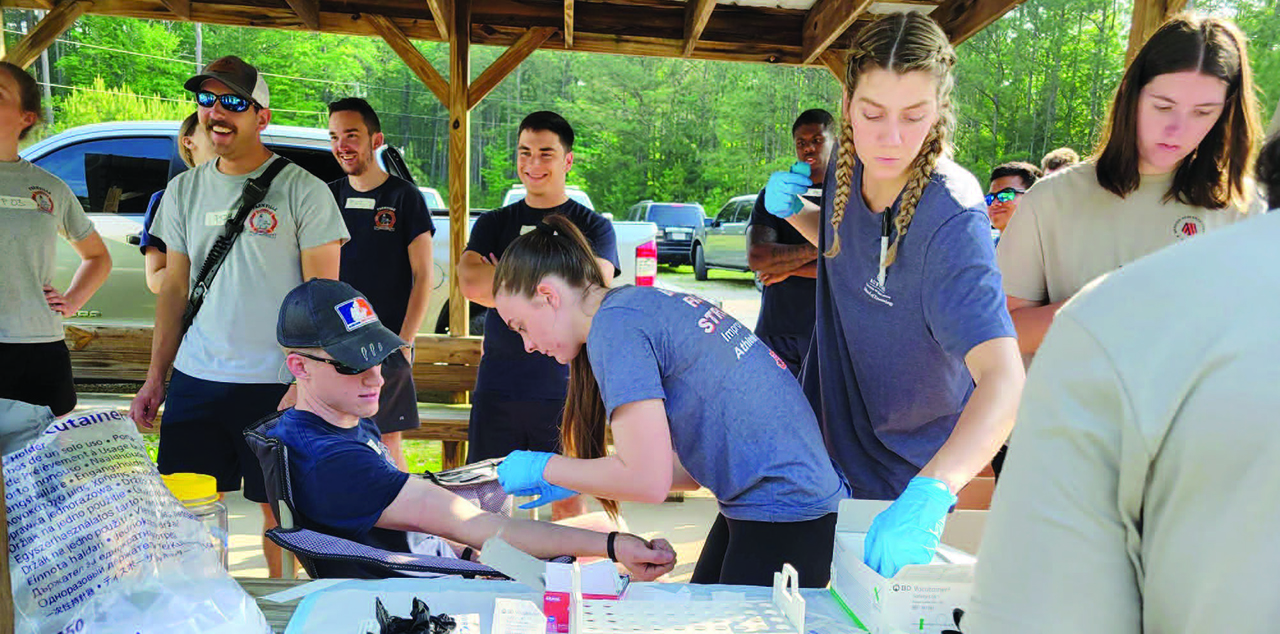 Members of the Warrior Research Center conduct lab blood draws on military personnel.
Members of the Warrior Research Center conduct lab blood draws on military personnel.
Sefton and her graduate student research team tracked injuries and demonstrated what it cost the Army in terms of personnel time loss and medical expenses. They discovered the majority of the injuries were overuse injuries, especially stress fractures that could not heal quickly because of the accelerated training.
They developed interventions, including educating trainees on how to run, building athletic training rooms and provisioning them with the right equipment and teaching drill sergeants about stretching, flexibility and warming up. They also examined nutrition and other health factors to improve trainee performance. And, perhaps most importantly, they trained the soldiers to understand why they should not hide injuries.
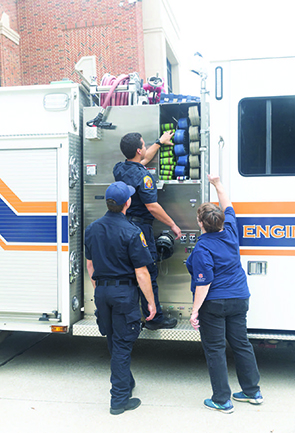 JoEllen Sefton works with members of the Auburn Fire Department.
JoEllen Sefton works with members of the Auburn Fire Department.
“Reporting injuries was a huge culture change,” Sefton said. “It took a lot of education to teach them that, if they report it and get help from an athletic trainer right away, they will be back into training in a day or two. If they hide it until it gets really bad, they can be out for months. It was an enormous change to go from the ‘We don’t want to make ‘em weak’ mindset to one of achieving training goals while reducing injuries.”
Over the course of eight years, the Warrior Athletic Training program grew from one battalion and three embedded athletic trainers assisting with soldier injury assessment and recovery to 33 athletic trainers serving all five training brigades at Fort Benning. In that time, the program served more than 860,000 soldiers in training and cadre, treated more than 510,000 new injuries, saved 1,692,872 soldier training hours by reducing lost training time due to injury and saved the Army more than $30 million in medical costs.
In addition, the program fully funded 85 graduate students as they earned their master’s degrees at Auburn in the School of Kinesiology.
“JoEllen Sefton’s passion and concern for the tactical athlete is the driving force for her efforts to improve performance while reducing injury and improving health and wellness of our military,” said Ronald L. Burgess Jr., retired Lt. Gen., U.S. Army. “Dr. Sefton’s hard work continues to have a positive and lasting impact on our military, tactical athletes, Auburn students and the Auburn community and reflects Auburn University’s commitment to both community outreach and to serving our military.”
Warrior Research Center
In 2010, Sefton expanded her work with the Warrior Athletic Training program to found the Warrior Research Center (WRC) in the College of Education. With a mission to maximize soldier readiness through improved health and performance, the WRC enables tactical athletes to safely complete the occupational demands of their jobs.
“The inspiration for the WRC came from a need I saw to bring together the resources of Auburn University to address the needs of our tactical personnel, families and veterans,” Sefton said. “We built off the success of the Warrior Athletic Training Program and continued to use a sports medicine model and extensive data collection to determine trends to develop protocols for injury prevention. Our research programs evolved to answer questions and improve care and training of service members.”
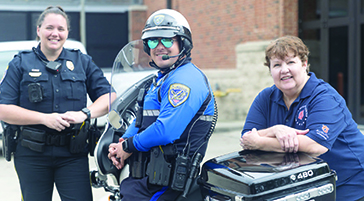 JoEllen Sefton works with the Auburn Police Department to improve officer physical fitness.
JoEllen Sefton works with the Auburn Police Department to improve officer physical fitness.
For the military, those research programs have included:
- Evaluating vehicles and equipment for their impact on soldiers’ musculoskeletal systems, including UH-60 Blackhawk helicopter pilot seats, M1A1 Abrams tanks, Bradley Fighting Vehicles and Stryker infantry fighting vehicles;
- Developing whole-body vibration protocols for musculoskeletal treatment and prevention;
- Technology evaluation: Real-time core body time monitoring via smartwatch with machine learning for command level situational awareness;
- Prosthetics: Prosthetic device and service satisfaction, quality of life and functional performance in lower-limb prosthesis clients.
“The work of the WRC has changed how the Army trains and cares for soldiers,” Burgess said. “The Warrior Athletic Training Model, a WRC program, has been expanded to Army and Air Force training locations nationwide. The work of the WRC has saved the military millions of dollars and hundreds of thousands of lost training hours.”
 JoEllen Sefton looks on as Cole Bordonie conducts a lab blood draw on a member of the military.
JoEllen Sefton looks on as Cole Bordonie conducts a lab blood draw on a member of the military.
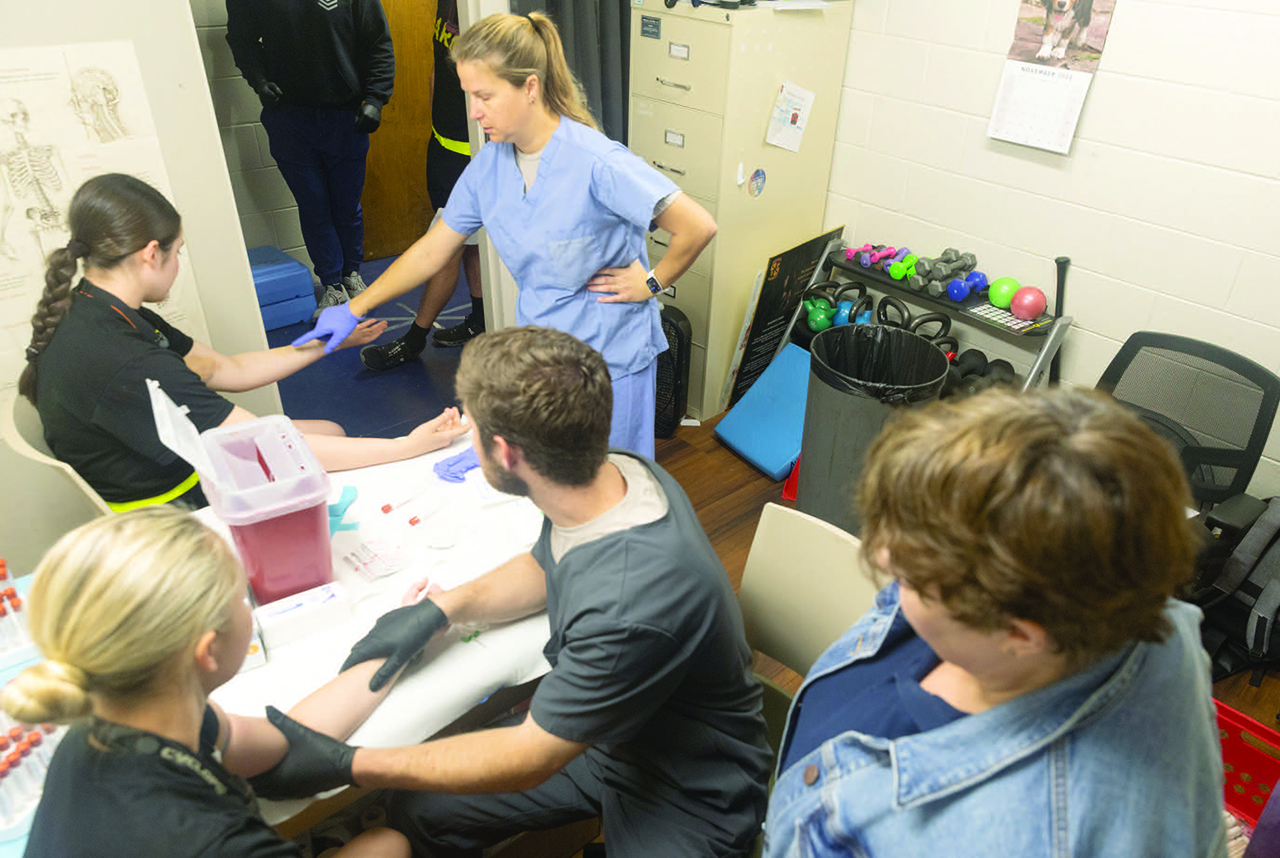 JoEllen Sefton and members of the Warrior Research Center collect bloodwork from Army soldiers.
JoEllen Sefton and members of the Warrior Research Center collect bloodwork from Army soldiers.
The WRC also has expanded its work to help first responders in and around Auburn.
“We started working with Auburn firefighters about eight years ago, specifically on heat issues, and we’ve had a great relationship with them,” Sefton said. “We have an environmental chamber on campus where we can exercise people in heat and study its cognitive and physical effects.”
In addition, the Auburn Police Department tapped Sefton and the WRC when it became aware its officers had high rates of cardiovascular disease. The request for help resulted in wellness screenings, a series of workshops on fitness and an embedded graduate student who helps in the police and firefighter gym on Ross Street, answering their questions and helping them achieve their fitness goals.
“Our goal: get someone back to their job and keep them alive,” Sefton said.
To date, the WRC has generated more than $13 million in funding for its research, all dedicated to generating solutions for military tactical athletes and first responders.
“The WRC has become the go-to place for Auburn researchers, industry, small businesses and government organizations to find the resources needed to solve problems,” Sefton said. “The development of the WRC has required all of my professional skills as an educator, researcher, outreach academic, networker, director and, at times, a politician to bring together the resources, funding and end users to drive the WRC forward to meeting our mission. I’m proud that the work of the WRC is built on a foundation of solid, peer-reviewed, evidence-based science.”
What's next? BOLT
In 2024, Sefton and the WRC were tapped by the Air Force to develop BOLT, a comprehensive performance initiative for military service members attending Air University at Maxwell Air Force Base in Montgomery, Alabama. Armed with a $500,000 grant, Sefton and her team of faculty members, postdoctoral researchers and graduate and undergraduate students are creating a method to improve service members’ quality of life and professional performance.
The first phase started in July when Sefton and her team screened the health and wellness of 500 military service members currently teaching and studying at Air University’s Air Command and Staff College, a school that prepares students for higher-level positions in military or government, including those in air, space and cyberspace operations.
“We found real differences in fitness between the men and women,” Sefton said. “Each excels in different areas. Our experts are there to provide specific interventions and help them work on that. In April 2025, before they leave the program, we’ll screen them again to see if they have improved.”
With their wide-ranging expertise, the team from kinesiology can build programs for every individual that include personalized fitness plans, nutrition advice, cognitive performance improvement and stress reduction techniques. They will be on base several days a week so service members can easily access guidance.
Sefton and her BOLT team are also launching wellness programs in mindfulness, sleep and other factors that speak to the Air Force’s four pillars of Comprehensive Airman Fitness: physical, social, spiritual and mental.
“We’re trying to get them to look at a holistic kind of health package and then we’ll evaluate: did the participants come see us? Did those that did come see us get better?” Sefton said. “This is really a beta year, but our hope is that we’ll be able to demonstrate these interventions are necessary and effective and that we’ll be able to scale up the program to other Air Force schools.”
As her work continues to evolve and expand, Sefton tells her students and others who are looking to help address issues in their community that flexibility in thinking is tantamount.
“Anyone working in the field of kinesiology needs to have an acute ability to communicate and collaborate with people who think differently than you do. That flexibility is key to solving problems,” Sefton said. “When you see how your work impacts people’s health and their ability to do their jobs, it’s very rewarding.”
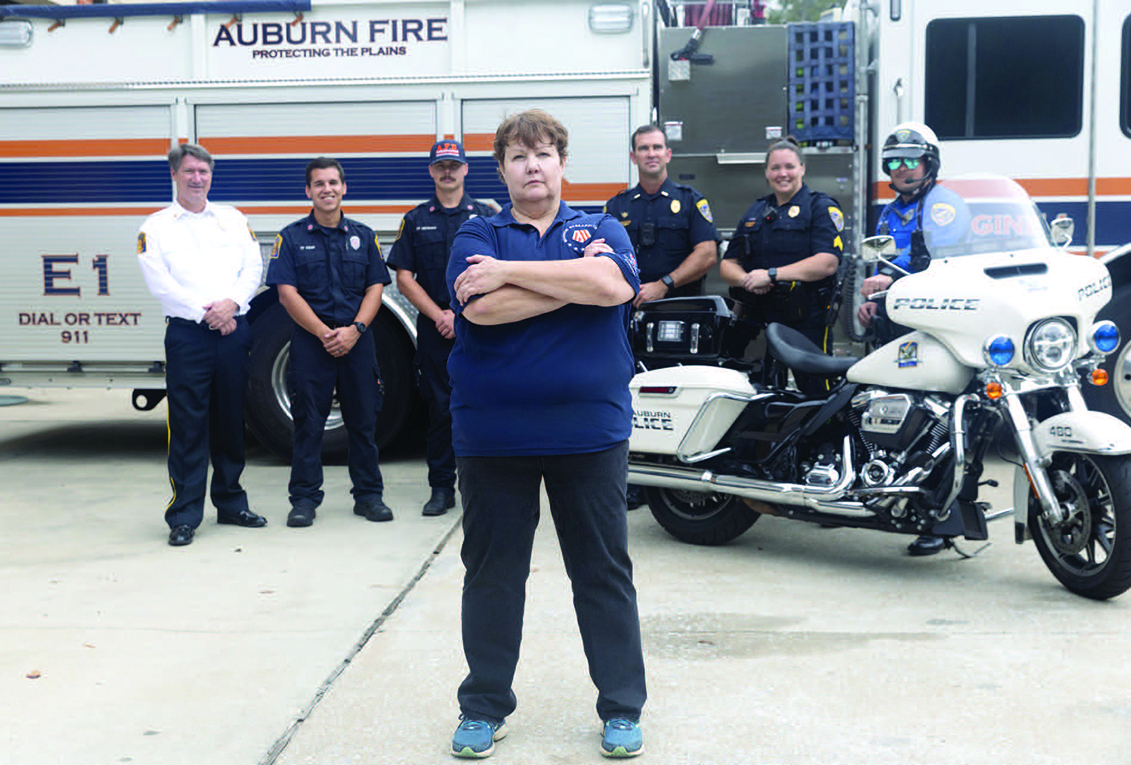 JoEllen Sefton works closely with the Auburn Police Department and Auburn Fire Department to improve physical ftness and reduce injuries. The real-world application of her research has led to the development of real-world solutions to problems faced by military personnel, police officers, firefighters and other first responders.
JoEllen Sefton works closely with the Auburn Police Department and Auburn Fire Department to improve physical ftness and reduce injuries. The real-world application of her research has led to the development of real-world solutions to problems faced by military personnel, police officers, firefighters and other first responders.
The Royrickers Cook Endowed Engagement award was presented at the Outreach and Engaged Scholarship Symposium in September.
The award, named in honor of Cook, an internationally recognized leader in higher education who serves as the vice president for University Outreach and associate provost, is given to a faculty or staff member who demonstrates an ongoing and purposeful commitment to outreach.
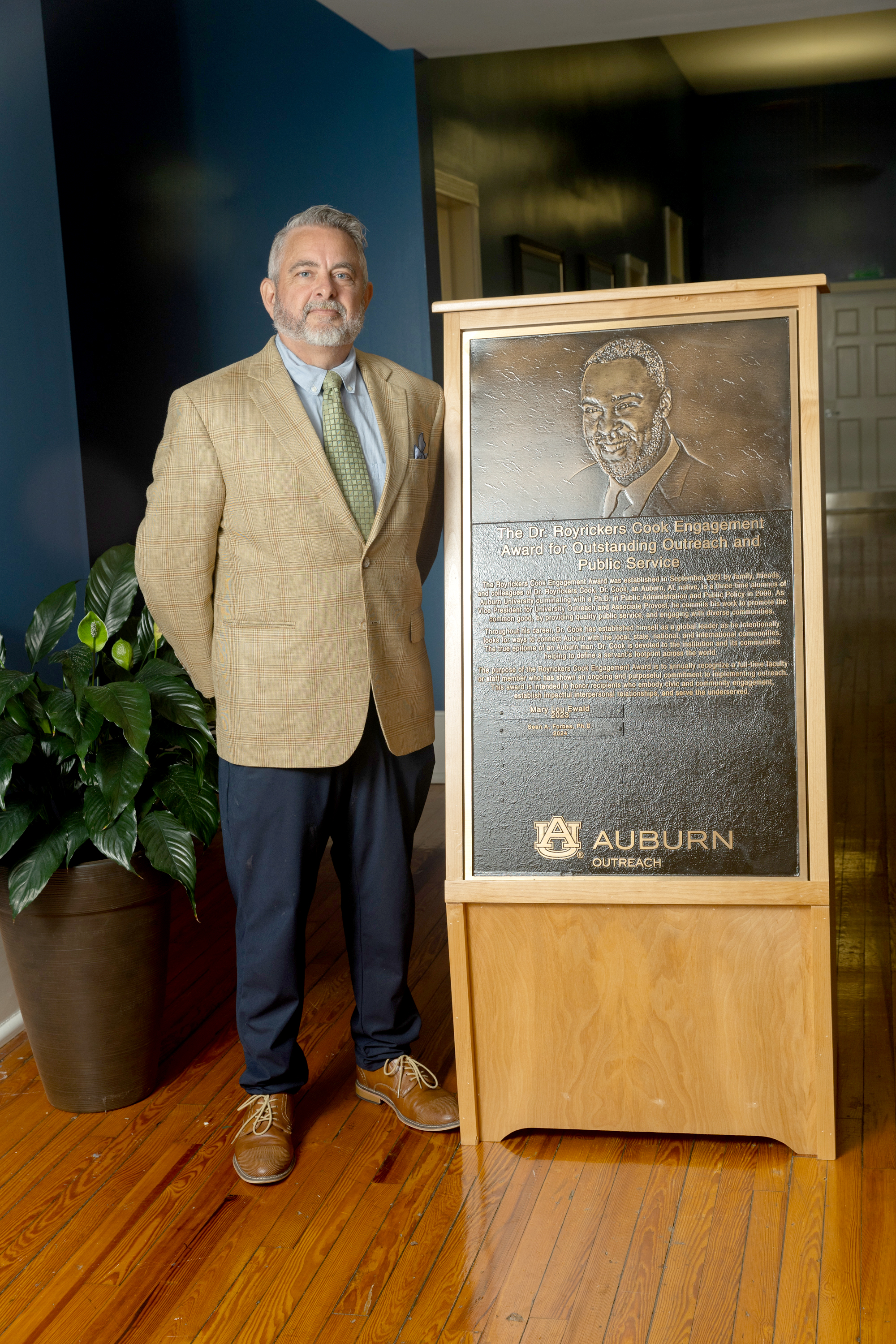 Forbes received the prestigious 2024 Royrickers Cook Endowed Engagement Award.
Forbes received the prestigious 2024 Royrickers Cook Endowed Engagement Award.
This year, the award was presented to Sean Forbes for his exceptional support for civic and community engagement, interpersonal relationships and serving the underserved. Forbes’ contributions to the community exceed his role as an associate professor of educational psychology.
His Opelika Grows (O Grows) initiative has created a space for engagement that amplifies and honors the needs of local people by fostering sustainable relationships with those in need. O Grows is a community garden that encourages students and volunteers to connect and nourish the Auburn-Opelika family by cultivating food with a purpose.
“The O Grows program exemplifies the university’s commitment to community partnership and outreach by addressing issues of food insecurity in the Opelika area,” said College of Education Dean Jeffrey Fairbrother. “It is an honor for Sean Forbes to be recognized by University Outreach with this prestigious award, and it reinforces our commitment to continue this important work.”
The program uses produce to help curb food insecurity and inspire illuminating conversations between those who engage with O Grows. Forbes also extends his program’s impact to include opportunities to those serving time in the juvenile court system who need community service hours. This helps bridge gaps between community members from different levels of society.
The organization hosts the Opelika Grows Farmer’s Market every Tuesday at the Southside Center for the Arts. The market offers fairly priced fresh produce and assists locals by offering space for farmers who accept food benefits like SNAP and the Senior Farmers Market Nutrition Program. Forbes’ expert application of his research and education has created a resource for the people of Auburn-Opelika to grow in spirit and health.
Nedret Billor
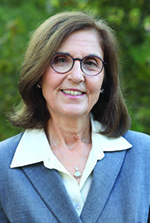
Nedret Billor, a professor in the Department of Mathematics and Statistics, has significantly advanced the field of data science and statistics through her extensive outreach work at Auburn University. As the principal architect of the Master of Science in Data Science and Engineering (DSE) program, Billor has equipped students with essential data science skills through hands-on projects with industry partners like GE Aviation and Southern Power. Her involvement in the Rural Health Initiative has improved healthcare delivery in rural Alabama, and her leadership in developing the PhD in Statistics and Data Science has expanded Auburn’s interdisciplinary offerings. As co-director of the forthcoming Center for Data Science and Innovation (CDSI), Billor supports interdisciplinary research and community engagement in data science. Her outreach has trained over 500 individuals locally and fostered international collaborations, significantly benefiting local and global communities. Through her dedication to education, mentorship and community service, Billor exemplifies the qualities of an outstanding faculty member committed to impactful outreach.
Kimberly Braxton Lloyd
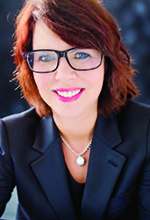
Kimberly Braxton Lloyd, associate dean of clinical affairs and outreach in the Harrison College of Pharmacy, has significantly contributed to community outreach. As the associate dean, she has spearheaded numerous initiatives that have positively impacted the university and the broader community. Braxton Lloyd played a pivotal role in establishing the Auburn University Pharmaceutical Care Center and the Office of Clinical Health Services, which provide comprehensive medication management and health services. She developed the State Wellness Center Clinic and Pharmacy in Montgomery, Alabama, and the Healthy Tigers program, improving healthcare access and wellness for state employees and Auburn University staff. During the COVID-19 pandemic, Lloyd led Auburn University’s response efforts, ensuring essential health services were available. Her outreach extends to underserved populations through the Auburn University Health Care and Education Clinic at the Boykin Community Center. Braxton Lloyd’s work has advanced the role of pharmacists in community health, earning recognition for her innovative and impactful initiatives.
Leanne Dillard
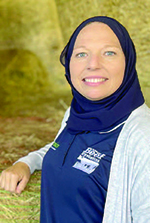
Leanne Dillard, associate professor and extension specialist in the Department of Animal Sciences and Department of Crop, Soil, and Environmental Sciences in the College of Agriculture, has significantly contributed to the agricultural community through her extensive outreach activities at Auburn University. As an expert in forage and ruminant nutrition, Dillard focuses on improving livestock sustainability by developing and implementing forage livestock systems. She leads interdisciplinary teams to deliver research-based recommendations that enhance forage management practices, benefiting farmers across Alabama and the Southeast. Dillard’s outreach includes organizing regional training programs, such as a 2022 in-service training for over 80 Extension agents and 20 specialists from nine states and facilitating online training for over 200 participants. Her efforts align with Auburn’s land-grant mission, integrating teaching, research and Extension to advance agriculture. Dillard’s work has directly benefited farmers by improving grazing systems, reducing input costs and promoting environmental sustainability, making her a leader in agricultural outreach and education.
Emily McGlohn
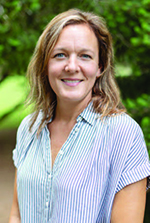
Emily McGlohn is an associate professor and extension specialist in the School of Architecture, Planning and Landscape Architecture, College of Architecture, Design and Construction. She has made significant contributions to community outreach through her work with Auburn University’s Rural Studio. Her efforts focus on improving living conditions in rural Alabama, particularly in the Black Belt region, by addressing housing and wastewater management challenges. McGlohn leads third-year architecture students in design-build projects, constructing homes that emphasize sustainability and resilience. She has also played a crucial role in the Rural Wastewater Demonstration Project, addressing inadequate wastewater treatment systems in the region. McGlohn’s outreach is characterized by her deep commitment to the communities she serves, marked by empathy, cultural sensitivity and collaboration. Through the Front Porch Initiative, she extends the impact of Rural Studio’s work to other underserved communities. Her contributions have been recognized through various grants and awards, highlighting the impact of her efforts on both academic and local communities. McGlohn’s work exemplifies the integration of teaching, research and community service, making a lasting impact on the communities she serves.
Wilmer Pacheco
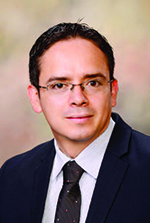
Wilmer Pacheco, associate professor of poultry science in the College of Agriculture, has significantly impacted the poultry and feed industries through his extensive outreach work at Auburn University. His efforts focus on improving feed manufacturing processes, enhancing poultry nutrition and ensuring compliance with industry regulations. Pacheco has developed a robust extension program that supports Alabama’s feed industry and introduces innovative practices essential for the future. He has been instrumental in helping feed mills comply with the Food Safety Modernization Act and has organized multiple training sessions to ensure safe and efficient operations. Internationally, Pacheco has collaborated with organizations to develop training programs for the Soy Excellence Centers, enhancing productivity and food security in regions like Nigeria, Southeast Asia and Latin America. His outreach also includes the globally recognized Feed Science Podcast and partnerships with institutions like Zamorano University in Honduras. Pacheco’s dedication to outreach is evident in his numerous publications and presentations, significantly advancing Auburn University’s mission and demonstrating the vital role of academic outreach in addressing real-world challenges.
Alicia Powers
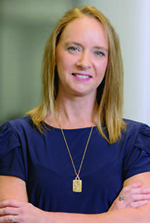
Alicia Powers, managing director of Hunger Solutions Institute (HSI) in the College of Human Sciences, has made significant contributions to community health and nutrition through her extensive outreach work. As managing director of the HSI, Powers has spearheaded numerous initiatives aimed at addressing food insecurity and promoting healthy eating habits both locally and globally. Her career in community nutrition began with co-founding LiveWell Greenville, a non-profit focused on healthy eating and active living. At HSI, Powers has secured over $13 million in grant funding, supporting programs like the End Child Hunger in Alabama initiative and the Alabama Campus Coalition for Basic Needs. She has also led the Nourish Wellness program and several large-scale nutrition incentive programs, such as the Alabama Gus Schumacher Nutrition Incentive Program and the Healthy Fluid Milk Initiative. Powers’ outreach efforts have profoundly impacted community health, improving access to healthy foods, addressing food insecurity, promoting holistic health care and exemplifying the integration of research, education and community service.
Ryan Thomson
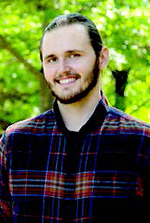
Ryan Thomson, assistant professor in the Department of Agricultural Economics and Rural Sociology in the College of Agriculture, has made significant contributions to addressing heirs’ property issues through his extensive outreach work at Auburn University. As chair of the USDA Southern Extension and Research Activity’s project on heirs’ property, Thomson has co-authored a multistate project and train-the-trainer curriculum, training hundreds of Extension agents, lawyers and community organizers across the U.S. His work with organizations like the Southern Poverty Law Center and the Gullah/Geechee Community Land Trust underscores his commitment to supporting historically marginalized communities. Thomson co-founded the Alabama Heirs’ Property Alliance, creating accessible educational frameworks and organizing community education efforts. His research-driven approach has produced valuable educational materials and secured significant grant funding, including $650,000 from the USDA NIFA for the “Gaining Ground” project. Thomson’s outreach has garnered national attention, making him a leading voice on heirs’ property issues and promoting long-term economic justice and sustainability for disadvantaged families.
Katilya Ware
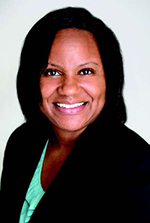
Katilya Ware, associate professor in the College of Nursing, has made significant contributions to community health through her extensive outreach work at Auburn University’s College of Nursing. Her efforts focus on improving maternal health outcomes and addressing substance use among adolescents, particularly in underserved communities. Ware’s “Improving Maternal Health and Pregnancy-associated or Related Deaths through Community Togetherness” (IMPaCT) program addresses maternal health disparities by increasing awareness and fostering collaboration among African American women, their families and healthcare providers. She also leads the “East Alabama Breakthrough for Youth” program, educating adolescents about stress management and healthy coping mechanisms to combat vaping and e-cigarette use. Ware has reshaped prenatal education courses and initiated the first summer bridge program in the College of Nursing to support underrepresented students. Her outreach has educated over 500 adolescents and impacted more than 40 students, significantly improving community health and addressing health disparities.
We are thrilled to announce the return of our Competitive Outreach Scholarship Grants, designed to support innovative faculty outreach projects that improve lives and solve problems. Stay tuned for more details and the announcement of the inspirational 2025 grant recipients and projects.
Let’s continue to make a positive impact together!
auburn.edu/outreach/facultyengagement/grants

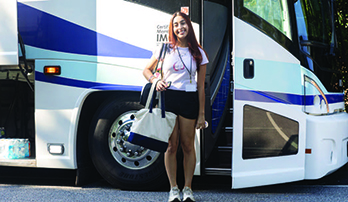 Dioselin Cruz, Auburn University senior and Community Outreach writer, shares her experiences from the Auburn Across Alabama travel experience with Auburn faculty and staff.
Dioselin Cruz, Auburn University senior and Community Outreach writer, shares her experiences from the Auburn Across Alabama travel experience with Auburn faculty and staff.
Auburn University Outreach hosted the annual Auburn Across Alabama travel experience to the Black Belt region of Alabama in August 2024. The initiative was organized by Jocelyn Vickers, director of the Office of Public Service, in collaboration with the Office of Faculty Engagement.
Faculty and staff interested in partnering with organizations and community leaders to revitalize small towns in the Black Belt participated in the tour, which included stops in Selma, Boligee, Greensboro and Newbern. Selma was the first stop on the tour.
Auburn University student Dioselin Cruz joined Auburn faculty and staff for the trip. “As a student, I was honored to be included in this trip,” Cruz said. “As a history major, walking into Selma felt almost like a spiritual experience. Moments in time came to life all of a sudden.”
The group gathered with city representatives and local partners at Reflections Coffee Shoppe, located near the Sullivan “SNCC” building and across from the Selma Historical Interpretive Center, to discuss plans.
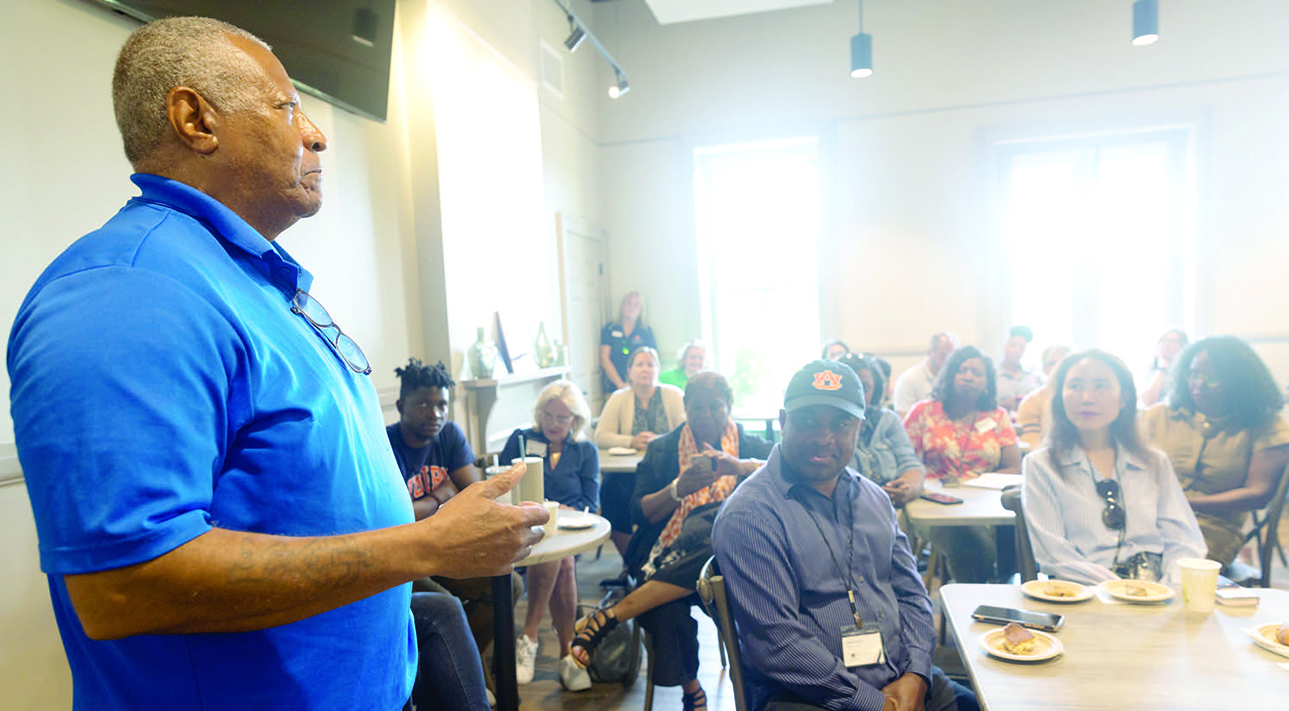 Auburn University faculty, staff and students in conversation with Black Belt community members and leaders during the Auburn Across Alabama experience. The mayor of Selma leads a community discussion.
Auburn University faculty, staff and students in conversation with Black Belt community members and leaders during the Auburn Across Alabama experience. The mayor of Selma leads a community discussion.
Kevin Moore and Mackenzie Stagg, professors from the School of Architecture, Planning and Landscape Architecture, are working to help reconstruct Selma, including building affordable homes.
Stagg collaborates with the Selma Housing Authority through the Rural Studio Front Porch initiative. “They have a better sense of what these communities need,” Stagg said. She emphasized that a strong bond between the university and local partners is essential to the success of these projects.
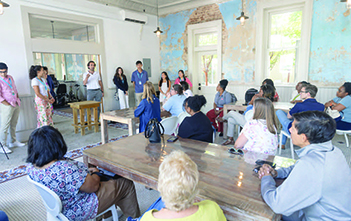 John Dorsey, M.D. speaks with Auburn Across Alabama participants about Project Horseshoe Farm, a community health nonprofit.
John Dorsey, M.D. speaks with Auburn Across Alabama participants about Project Horseshoe Farm, a community health nonprofit.
While in Selma, the group spoke with Mayor James Perkins Jr., who urged them not to limit Selma’s identity to its civil rights legacy. “There’s a lot more to this community than March 7 and March 21 of 1965,” Perkins said.
“This shifted something for me,” Cruz reflected. “I realized that a hyper fixation on the past could pose real dangers for communities wanting to progress beyond the parameters the world has crafted for them.”
Perkins shared his vision of fostering a multicultural community in Selma, demonstrating that rural America is thriving.
At the next stop in Boligee, Rodney Granec from the Office of Sponsored Programs at the University of West Alabama (UWA) highlighted the importance of maintaining internet connectivity in rural areas.
Through the federal Connecting Minority Communities Program, UWA has provided internet service in Boligee, enabling the installation of an OnMed station provided by Auburn University.
Auburn’s Outreach Rural Health Initiative, in collaboration with the Alabama Cooperative Extension System (ACES), arranged for the OnMed station to provide telehealth services, increasing access to healthcare in communities lacking local medical care providers.
However, Sharon Haynes, assistant director of field operations at ACES, cautioned, “It’s not a replacement for health care.”
In Greensboro, Project Horseshoe Farm (PHF) addresses health challenges in rural areas. Dr. John Dorsey, founder and executive director of PHF, integrates community support with healthcare using a sociological approach.
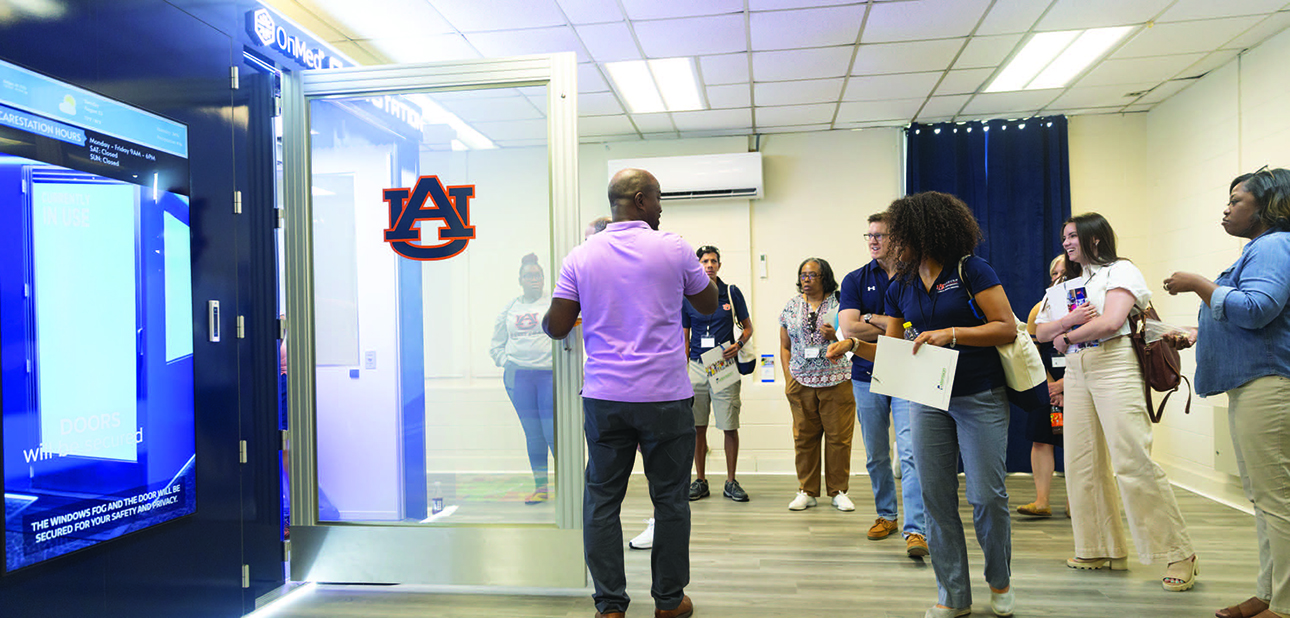 The Auburn Across Alabama expedition included a tour of the OnMed station installed in Catherine, Alabama (Wilcox County).
The Auburn Across Alabama expedition included a tour of the OnMed station installed in Catherine, Alabama (Wilcox County).
PHF interns and fellows assist with Youth and Community Center Programs, which include ACT prep sessions, life skills workshops, and community trips. Fellows also support seniors transitioning out of hospital care through the Health Partners program, fostering relationships with their senior partners.
This holistic approach addresses patients’ individual needs beyond their medical diagnoses.
The final stop was Rural Studio in Newbern, where director Andrew Freear leads student design projects.
“There’s a legacy of beautiful architecture here ... and a legacy of civil rights history here,” Freear said, emphasizing that his initiatives honor both.
Rural Studio projects include constructing homes and public buildings like the Newbern Town Hall and Library. Since its opening, the library has become a community hub, hosting summer reading programs, Black History Month events, wax museums and exhibitions from the Jule Collins Smith Museum of Fine Art.
Rural Studio challenges student architects to prioritize people in their designs. “We try to challenge them about the way they lead their lives after this,” Freear said.
Much like Rural Studio, the Auburn Across Alabama trip encourages participants to reflect on their contributions to society.
Cruz acknowledged the trip’s impact on her. “I feel compelled to help grow the unique magic rural Alabama exudes,” she said. “The Black Belt contains great potential, and I can only hope to be a small part of that story.”
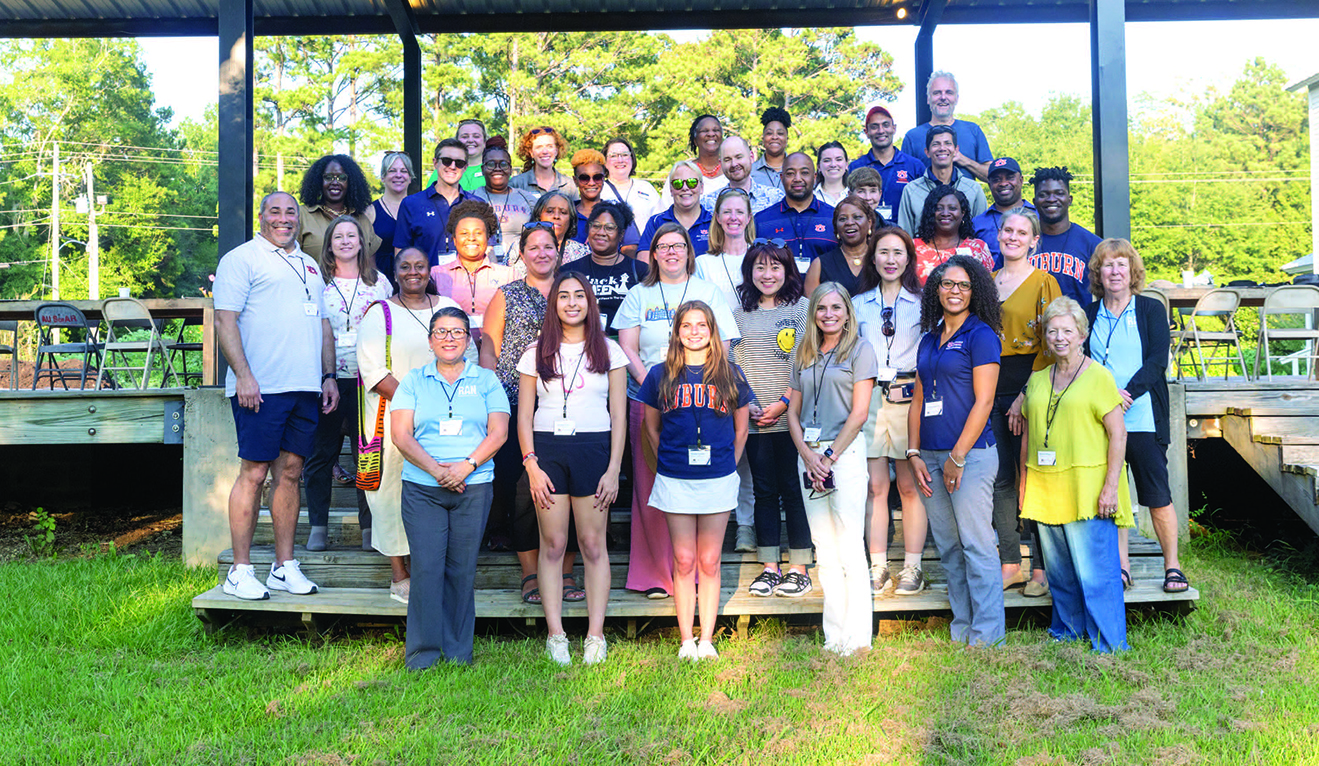 Auburn University cohort visited with organizations and community leaders in Alabama Black Belt counties, including stops in Selma, Boligee, Greensboro and Newbern.
Auburn University cohort visited with organizations and community leaders in Alabama Black Belt counties, including stops in Selma, Boligee, Greensboro and Newbern.
The best leaders know how to bring out the best in people. These leaders create a special bond. They are more attentive and more compassionate, and their guidance can often change the course of a project or a life. These leaders help people face their difficulties, build on their strengths, make challenging decisions and assess the best way forward. Quite simply, these leaders know how to be a coach. Coaching is a learned blend of cognitive, behavioral and social-emotional skills to direct feedback related to strengths, challenges and weaknesses enhancing one’s self-awareness. Now, a coaching program is offered at Auburn University.
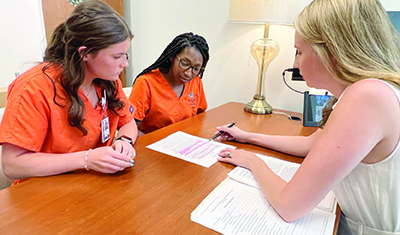 Kendall Henderson, Auburn University assistant professor and academic coach, has founded the National Consortium for Nursing Academic Coaches. The OPCE coaching program is credentialed through the International Coaching Federation (ICF), which is considered the standard for coaching certifications found within higher education at the masters and doctoral level. With more than twenty-five years of evidence-based research to support their work, ICF is the largest and most recognized credentialing body in the world. ICF certification is a primary requirement in many domains, ranging from corporate entities to Federal government.
Kendall Henderson, Auburn University assistant professor and academic coach, has founded the National Consortium for Nursing Academic Coaches. The OPCE coaching program is credentialed through the International Coaching Federation (ICF), which is considered the standard for coaching certifications found within higher education at the masters and doctoral level. With more than twenty-five years of evidence-based research to support their work, ICF is the largest and most recognized credentialing body in the world. ICF certification is a primary requirement in many domains, ranging from corporate entities to Federal government.
Auburn University’s Office of Professional and Continuing Education (OPCE) and the College of Nursing have launched an industry-standard coaching credential for nurse educators. “The goal is to provide effective solutions for emerging issues and to equip individuals with the skill sets to meet the challenges they face in their respective careers and organizations,” according to Hope Stockton, assistant vice president for University Outreach and Professional and Continuing Education. “We are currently experiencing a demand for coaching skills in other disciplines as well. As a result, look for an expansion of this program in the coming year.”
One of the first participants and ambassadors for the concept is Kendall Henderson, an assistant clinical professor and academic coach in the Auburn University College of Nursing.
“The reality is that nursing is a hard career. Newly graduated nurses often experience a higher level of stress than they expect and may leave the bedside after two to three years to move into clinic settings or to return to school,” Henderson said. “We believe that nurse coaching will help build a support network to help address some of the problems they face.”
Working first as a nurse in Atlanta, and now as a faculty member, Henderson realized that students need more from their education than the curriculum can provide. They need a trained coach to help ground their expectations. After searching nationally, Henderson found there was not a national professional organization for nursing academic coaches. So, she started one. The National Consortium for Nursing Academic Coaches is a new organization that will have its first conference next year at Auburn.
Faculty in the Nursing College, along with faculty from five other nursing schools in the United States, are in a formal learning program to teach them how to be a coach, adding value to the overall education received by nursing students.
“For example, we work with students to develop self-regulation skills in their personal lives so that when they go out into the nursing field and have to regulate their emotions, they know how to do that because your coach has helped you work through it,” Henderson said. “It sounds so basic, but coaching can help nurses learn how to relate to people, and how to preserve and protect their own peace of mind in life and death situations.”
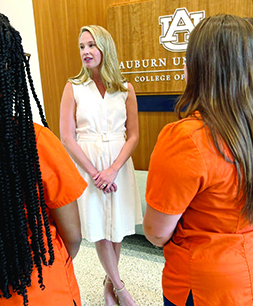 Nanci Hardin and Emily Roberts, two Auburn nursing students and Kendall Henderson discuss how changes in the nursing curriculum may impact their first job. Henderson is one of the trained nursing coaches available to guide students through tough decisions.
Nanci Hardin and Emily Roberts, two Auburn nursing students and Kendall Henderson discuss how changes in the nursing curriculum may impact their first job. Henderson is one of the trained nursing coaches available to guide students through tough decisions.
“Nurses do not leave their job because they cannot administer an IV. They leave because the return is not worth the investment in stress and emotional stamina. Death and loss are very real. Nursing coaches can help students understand what the profession involves, evaluate their goals and regulations and make informed choices,” she said.
“While in nursing school, learning resilience, adaptation and perseverance are just as important as the skills and knowledge their classes are focused on. This coaching certification has taught me how to not only help students work through their struggles, but also how to set them up for success when we are not around to help them. Before starting this certification course, my natural instinct as a nurse was to help students fix their obstacles by offering suggestions. After attending the courses and practicing coaching skills, I now know that teaching students the skills to fix things on their own will better equip them when they graduate,” Henderson said.
The coaching curriculum for nursing faculty includes 64 program hours of coursework, mentor coaching and a performance evaluation, combined with more than 100 hours of coaching experience and a passing score on the ICF Credentialing Exam. It results in an International Coaching Federation (ICF) Associate Certified Coach (ACC) Credential.
OPCE, in partnership with Shipley Coaching, a national leader in the field of professional coaching, has developed a program that combines the latest developments in Neuroscience, Human Behavior, Personal Development and 50 years of proven methodologies rooted in Neuro-Linguistics, Solution Focused Methods, Positive Psychology, and Appreciative Inquiry. Whether you lead employees, students or peers, these science-based comprehensive techniques will equip you with confidence to build a transformative professional coaching relationship with your clients. Upon completion, students earn an International Coaching Federation (ICF) Associate Certified Coach (ACC) Credential, the first of three levels of ICF certification.
“There is a great study from Rice University that found students in any major who worked with a professional coach exhibited larger changes in leader identity, self-concept clarity, humility, sense of purpose, and satisfaction with life,” said Phil Chansler, assistant director of Professional Development and Conference services. “It underscores the developmental value of coaching for young, emerging leaders.”
Now that the nurse coaching program is off the ground, Chansler is looking for other Auburn majors and departments that may also benefit from a coaching program. To learn how coaching can help your discipline, department or business enterprise, contact Phil Chansler at pac0012@auburn.edu.

Auburn University’s comprehensive transition program for students with intellectual disabilities is known as EAGLES, or Education to Accomplish Growth in Life Experiences for Success. Students in the program receive an inclusive post-secondary education providing them an enriching Auburn experience as they prepare for life now and in the future. The EAGLES program has welcomed students with intellectual disability to Auburn’s campus since 2018.
Christine Drew, assistant professor of Special Education, Rehabilitation, and Counseling, has worked with EAGLES students and their families for the past five years, teaching parents and students critical skills needed to succeed in college. Through her work, Drew noticed that many parents had never been trained to teach their children independent living skills and some did not realize the impact these skills would have on their children’s futures. These skills, such as showering, brushing their teeth, taking medications and getting dressed in the morning, are critical for living as independently as possible.
During a conference hosted by the EAGLES program at Auburn University, Drew met Kristin Lombardi, founder and director of Zeal. Zeal serves children, adolescents and young adults with autism spectrum disorder, developmental disabilities, intellectual disabilities, attention deficit disorder, attention deficit hyperactivity disorder and other unique learning needs. Lombardi works with many young adults with autism who are preparing to attend college. She noted parents face the same issues where she lives and practices in New York.
 Christine Drew, author and assistant professor of Special Education, Rehabilitation and Counseling, Auburn University’s College of Education
Christine Drew, author and assistant professor of Special Education, Rehabilitation and Counseling, Auburn University’s College of Education
Following the conference, the two discussed the best way to get this information to parents. They decided on a book, “Spectrum of Independence: How to Teach Your Neurodiverse Child Daily Life Skills,” focused on giving parents of neurodiverse children and adolescents a path forward to teach critical self-care skills in their homes.
“We walk parents through a step-by-step process with supporting activities to help them assess their readiness for change along with their child’s skill and independence level,” said Drew. “This book is unique as it is written for parents to use without the help of professionals. Reading this book and completing the activities allows parents to look at their children’s skills in a new way and think bigger about their child’s future. Their child may even aspire to be an Auburn student one day.”
The duo hopes their outreach efforts will solve a problem they have seen in the world, namely that parents of children with disabilities are not always aware of things they can do at home to prepare their child for college or independent living.
The parent-friendly book is set to be published in April 2025.
Outreach Programs and Projects Network

Through this database, Auburn University faculty can share information about their Outreach programs and projects to facilitate further engagement, promotion and partnerships.

As part of Auburn University’s land-grant mission, the Harrison College of Pharmacy’s (HCOP) Center for Opioid Research, Education and Outreach (COACH) has been involved in several programs and initiatives over the last year. These include an opioid awareness program for middle and junior high school students, town halls and a summit held throughout the state, and a series of conferences hosted along with the Alabama Department of Mental Health.
Tiger Giving Day Opioid Awareness Program
COACH developed an outreach initiative to reach middle and junior high school students across Alabama. This initiative educated more than 1,000 middle-school students on the harms of prescription and illicit drugs and introduced the profession of pharmacy. Funds to support the initiative were raised through Auburn’s annual Tiger Giving Day.

Research has shown that early educational intervention results in better outcomes for children and adolescents. COACH team members, pharmacy students and HCOP staff members traveled to four diverse middle school locations, presenting at assembly programs and workshops to discuss the dangers of abusing prescription drugs and experimenting with illicit drugs. To raise awareness, program T-shirts were presented to each participant.
“Our youth are exposed to so many things in today’s society that could lead to drug use accidentally or intentionally; however, quality education can save lives,” said Brittany Spencer, Ed.S., principal of Southside Middle School. “COACH’s opioid awareness program was educational, engaging and fun and demonstrated just how closely a drug can look to familiar candies and snacks.”
Townhalls and Summit Meetings
COACH is committed to professional education. As such, faculty are working to provide health care professionals with the knowledge to prevent, recognize and assist in treatment of opioid use disorders within their practice and community. These educational programs bring together a diverse health care audience to encourage communication and collaboration across disciplines. A team including COACH director Karen Marlowe, PharmD, professor Brent Fox, PharmD, PhD and associate clinical professor Haley Phillippe, PharmD, is working in partnership with the Alabama Department of Public Health to conduct a series of town hall meetings and summits across the state through the end of 2025. The town halls consist of an interactive Prescription Drug Monitoring Program demonstration and skills-building exercise led by Auburn University personnel with support from ADPH staff.
The 2023 Substance Misuse Summit brought together an interdisciplinary audience of more than 280 individuals. As of July 31, 2024, more than 800 individuals participated in training provided through this sponsored project. These programs are sponsored by the Alabama Department of Public Health through a parent grant funded by the Department of Justice, Bureau of Justice Assistance.
COACH/ADMH Conferences
COACH recently partnered with the Alabama Department of Mental Health (ADMH) to host conferences in Auburn and Tuscaloosa in July 2024, titled Advocating for Alabamians: A Substance Use Disorder Update. These conferences offered continuing education credits for multiple disciplines and were free of charge to participants. Presentations included expert content related to the topics of emerging trends in substance misuse, the Americans with Disabilities Act (ADA) and harm reduction. More than 100 individuals participated in these conferences. In addition, COACH partnered with ADMH to host a complementary prevention webinar in August of 2024 titled Altering Perceptions: Understanding and Addressing Substance Use Disorder Stigma.
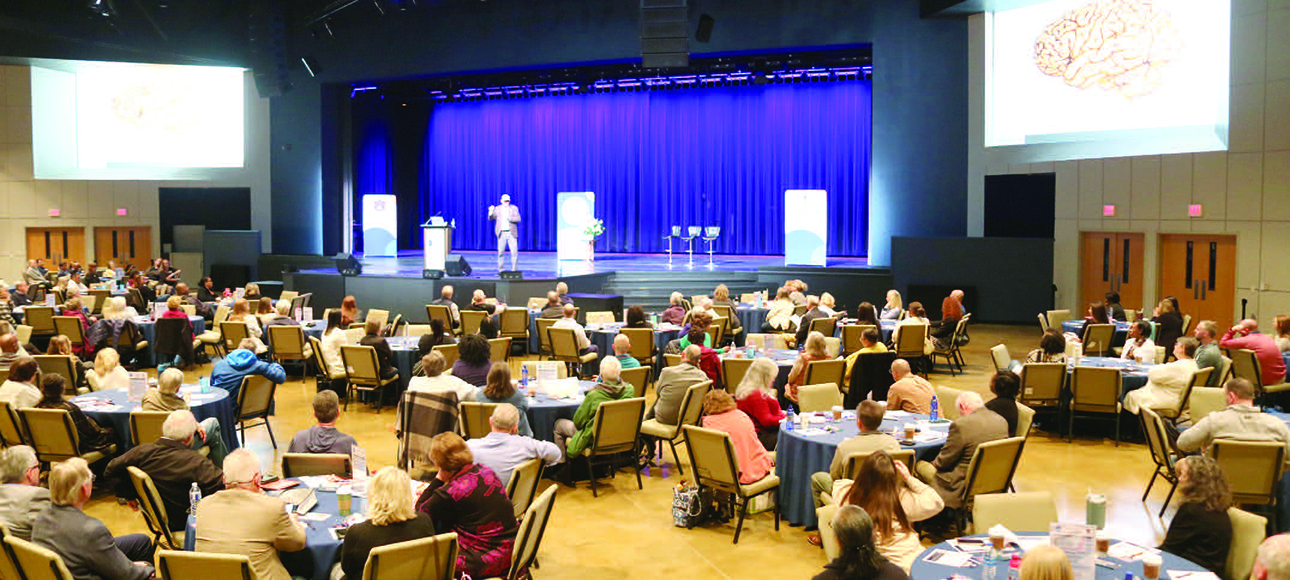 2025 COACH Substance Misuse Summit - designed to provide an opportunity to hear leaders in their respective fields provide the latest information on substance use disorders. It is intended for an interdisciplinary audience including physicians, physician assistants, nurse practitioners, nurses, pharmacists, pharmacy technicians, social workers, mental health professionals, recovery professionals, guidance counselors, school resource officers, civic leaders, judicial officials and law enforcement professionals.
2025 COACH Substance Misuse Summit - designed to provide an opportunity to hear leaders in their respective fields provide the latest information on substance use disorders. It is intended for an interdisciplinary audience including physicians, physician assistants, nurse practitioners, nurses, pharmacists, pharmacy technicians, social workers, mental health professionals, recovery professionals, guidance counselors, school resource officers, civic leaders, judicial officials and law enforcement professionals.
In an effort to address a shortage of teachers in rural areas of Alabama, Auburn University’s College of Education and University Outreach are teaming up to provide a new Rural Teacher Fellowship program that will launch in spring 2025.
In the leadup to the fellowship’s start, the program’s first two fellows were recently named, both of whom are seniors in the College of Education. Mary Wheelock, a native of Marietta, Georgia, majoring in elementary education, and Jessie Barclay, a Pelham, Alabama, native majoring in early childhood/elementary special education, will conduct their clinical residency as part of the new program in Eclectic, Alabama.
“I am thrilled to be serving as one of the Rural Teacher Fellows this upcoming spring and am excited to begin this opportunity to help better understand the needs for development of education in rural communities and to learn how I can make a difference as a future educator!” exclaimed Wheelock, a member of the Epsilon Eta chapter of Kappa Kappa Gamma and the Alpha Phi chapter of Kappa Delta Pi, an international honors society that recognizes and supports excellence in educators.
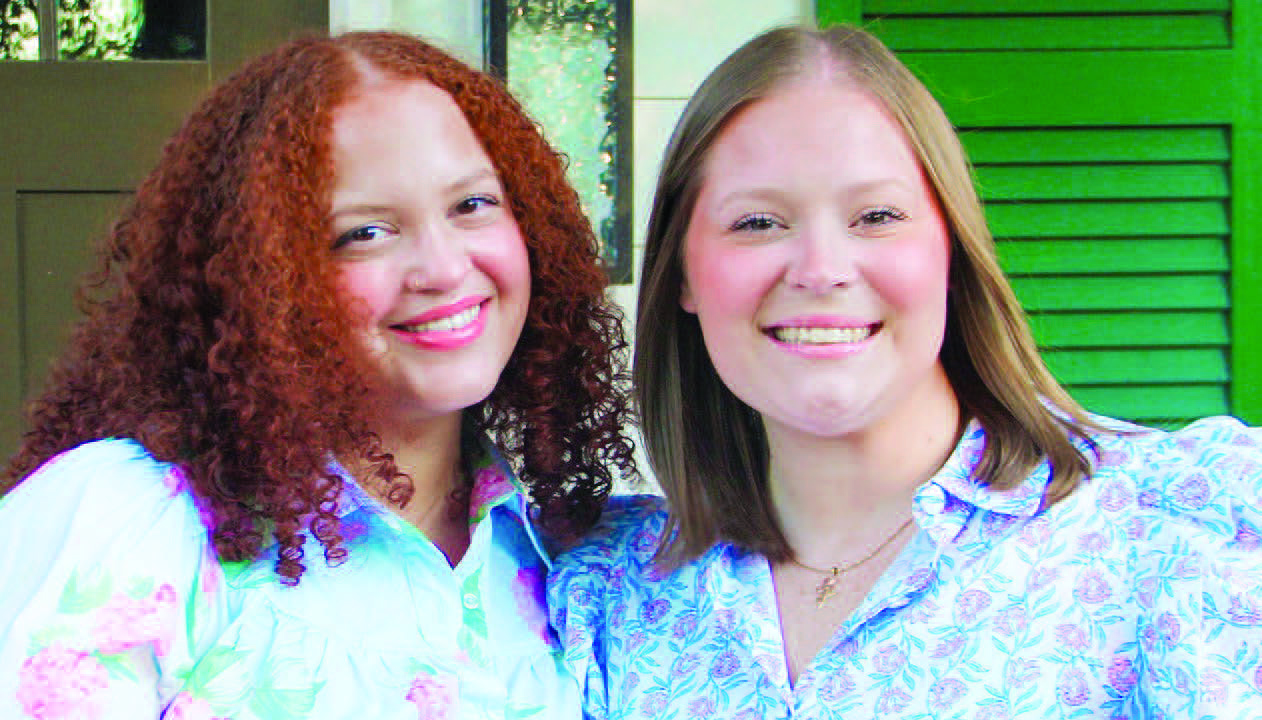 Mary Wheelock (left), an elementary education major, and Jessie Barclay, an early childhood/elementary special education major, have been named as the first two fellows in a new Rural Teacher Fellowship program that will launch in the spring.
Mary Wheelock (left), an elementary education major, and Jessie Barclay, an early childhood/elementary special education major, have been named as the first two fellows in a new Rural Teacher Fellowship program that will launch in the spring.
Barclay, a member of the Delta Sigma chapter of Delta Gamma and the Council for Exceptional Children in Auburn chapter, said she also eagerly awaits her fellowship.
“I am excited to be a fellow because this opportunity will allow me to make a meaningful impact in a rural community and give me valuable growth and experience for my future,” she said. “Working with students in special education, I look forward to fostering a supportive environment where every child can thrive and reach their full potential.”
Anna-Margaret Goldman, director of the Center for Educational Outreach and Engagement at Auburn, said the need is great for teachers in rural areas — especially in Alabama where almost half of the state’s students are in an area deemed rural. She said that in the United States, many rural schools are impacted by teacher shortages and turnover. Alabama, a largely rural state with a high percentage of low-income and minority students, is dramatically impacted by this gap.
Amid such a teacher shortage, the Nation’s Report Card ranks Alabama’s performance for rural students as the third lowest in the U.S.
“We believe that every child should have the opportunity for a quality education regardless of where they live,” Goldman said. “The Rural Teacher Fellows program can be part of transforming rural education in Alabama.”
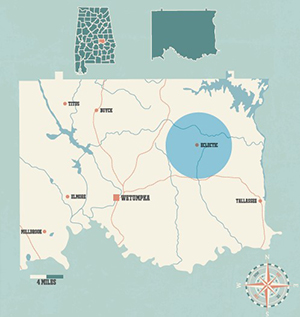
The fellowship program aims to address that issue and has received funding through Auburn’s most recent annual Tiger Giving Day event and through the Daniel Foundation, allowing it to offer student stipends of $3,000 each. Students in the program will become a fixture in the Eclectic community, with the group Children’s Harbor partnering to provide the fellows housing near Eclectic in the Lake Martin region. The fellows will also meet with local leaders and reflect on their experiences with peers and faculty. Funding is already secured to continue the program through next fall, with the possibility of three to four additional fellowships being available.
In the College of Education, Martina McGhee, assistant clinical professor of elementary education, and Kelly Schweck, assistant clinical professor in special education, say they see tremendous benefits from the new fellowship in the way of opening greater opportunities for students and awareness of the need for teachers in such rural communities.
“We are very excited that Jessie is participating in the Rural Teacher Fellowship program,” Schweck said. “It is an excellent opportunity to take what she has learned in her classes and field experiences and apply it in Eclectic while learning about and connecting with the community.”
McGhee and Schweck said Wheelock and Barclay are exceptional students and have been prepared well for the fellows opportunity.
To learn more about the Rural Teacher Fellows program, email Goldman at ayg0005@auburn.edu.
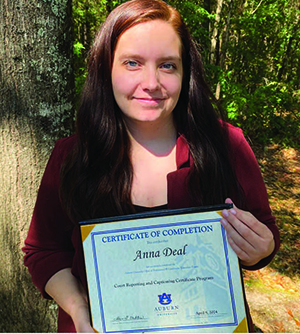 Anna Deal holding Certificate of Completion for the online Court Reporting program.
Anna Deal holding Certificate of Completion for the online Court Reporting program.
People celebrate educational milestones because they are real-life markers of accomplishment, raising individuals to new heights and new opportunities. Educational milestones change lives and become a part of those completing their education. But they do not just happen in an academic classroom.
Anna Deal reached a milestone that changed her life. She completed the Court Reporting at Home training in just 11 months. Then, after two months of internship, started work immediately after finishing the program. Deal accomplished this while caring for two toddlers at home.
Court Reporting at Home is a program offered by the Office of Professional and Continuing Education. It is the only program of its type in Alabama that is approved by the Alabama Court Reporters Association and offers all training online.
Shavon Williams, assistant director for Online Certificate Programs said, “The Court Reporting at Home program offers a unique opportunity for working professionals to go through the program in their own time.”
“Realtime Reporting and Captioning Theory is taught in this program. It is the shortest, easiest, real-time writing theory available and the only one that includes video tutorials that correlate with each lesson in the Theory Manual. Students are able to intern at hours that will not interrupt their current work schedule,” Williams said.
This self-paced, online, home study program is designed to prepare beginning students and transfer students with prior training to be real-time writing steno machine writers to prepare them for careers in court reporting, broadcast (closed) captioning and CART providing. As they write on the steno machine, the words appear in English on a computer screen or a television screen.
These exciting careers are in demand and provide job security. The U.S. Department of Labor expects the field of court reporters and simultaneous captioners to grow 3% between 2022 and 2032. Simultaneous captioners provide real-time transcription of live broadcasts, meetings and events for closed captioning purposes.
Court reporting offers various career paths, including working for agencies or firms, serving in government roles, or operating as an independent freelance court reporter. Additionally, individuals can pursue a position as an official court reporter within a courtroom setting. Closed captioning — writing the captions beneath television programs for hearing-impaired persons — allows individuals to work entirely from home. CART (Communications Access Realtime Translation) is primarily writing for hearing impaired college students and may be accomplished by working entirely from home or going to the assignment.
To see what learning opportunities are available to you, view the course listings at auburn.edu/outreach/opce.
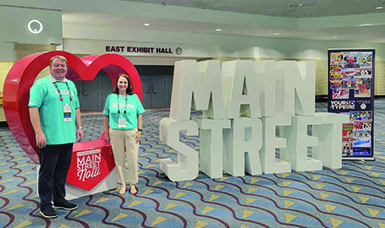 Jeremy Arthur and Jennifer Ryan are pictured at the 2024 Main Street Now annual national conference held in Birmingham.
Jeremy Arthur and Jennifer Ryan are pictured at the 2024 Main Street Now annual national conference held in Birmingham.
Main Street Alabama (MSA) is focused on bringing jobs, dollars and people back to Alabama’s historic communities. Economic development is at the heart of this statewide organization’s efforts to revitalize downtowns and neighborhoods across the state. Auburn’s Government and Economic Development Institute (GEDI) strives to promote economic development and improve the quality of life for Alabama communities and citizens, so the partnership with Main Street Alabama seems to be a natural one. Not only does GEDI partner with Main Street Alabama on many programs and initiatives, but GEDI’s director, Jeremy Arthur, has served on the MSA Board of Directors for seven years and is currently chairman of the organization.
“I am proud to serve as the chairman of the Main Street Alabama Board of Directors. It’s an exciting time to look at the incredible work being done in small towns, downtowns, and communities literally all across the state,” Arthur said. “Main Street Alabama recently hosted the Main Street Now conference for Main Street America in Birmingham, and it was a great opportunity to showcase the direct impacts our main streets have in our economy. From creating jobs, welcoming visitors, growing small businesses, historic preservation, revitalization and creating the quality of life that gives a place character and identity, our Main Street programs in Alabama are second to none. The thirty areas in our networked communities and the thirty-three designated communities combine to form a powerful voice working to drive an economic engine that has a significant impact locally and statewide.”
Main Street is a nationally recognized program that uses the four-point approach to revitalize downtown areas. The four points are organization, economic vitality, design and promotion. Main Street’s approach is unique because its guiding principles are different from other redevelopment strategies. These principles include a comprehensive approach, incremental projects, community involvement and strong public-private partnerships.
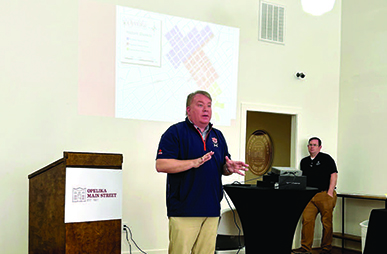 Jeremy Arthur speaks to a group of visiting Wyoming Main Street members at a Best Practices Workshop hosted by Opelika Main Street.
Jeremy Arthur speaks to a group of visiting Wyoming Main Street members at a Best Practices Workshop hosted by Opelika Main Street.
Main Street Alabama State Coordinator Mary Helmer Wirth is delighted with the relationship she has with GEDI and the work Arthur has done on behalf of the organization. “It has been a pleasure to have Jeremy on the board! He is well-spoken, educated about economic and community development, has a keen understanding of governance issues, and is a great recruiter of additional board members and committee members. I have truly enjoyed working with him. As our board chair, he is invaluable to the efforts of Main Street Alabama across the state,” Wirth explained.
Wirth went on to discuss her relationship with GEDI as an organization by saying, “I have been a guest presenter for many GEDI classes and have thoroughly enjoyed the insightful questions that are asked by the facilitators and class participants. Not long ago, I was a member of GEDI’s Intensive Economic Development class and found it to be an enlightening experience as well. Main Street Alabama looks forward to our partnership with GEDI and Auburn University for many years to come. Teaching the next generation of leaders is a huge responsibility, and we appreciate all Auburn does to assist with that”.
Arthur praised the Main Street-GEDI partnership as well saying, “Our office is proud to partner with and support Main Street Alabama and the work being done across the great State of Alabama. Many of the Main Street initiatives are being led and driven by Auburn alums who are working at the community level every day to ensure vitality and success of the places they now call home after graduation”.
Main Street Alabama works with communities across the state who apply to become designated Main Street communities. One of the 33 Alabama designated communities is Opelika. GEDI communications manager Jennifer Ryan currently serves as board vice chair and chair of the economic vitality committee for Opelika Main Street, which gives GEDI impact on a community level as well as at the state position. “Having someone from GEDI is very beneficial for our local Main Street community because it gives us someone who has knowledge and experience and will have a direct impact when it comes to economic development and growth for our downtown. Jennifer is an excellent addition to our board also serving on our economic vitality and promotions committees, where her expertise is vital in helping us with our goals”, explained Lisa Harrelson, Opelika Main Street board chair and City of Opelika community development administrator.
“Opelika is right here in Lee County, and it is where I live,” Ryan said. “Being involved with Opelika Main Street is not only good for the work I do at GEDI, helping us build better communities, but it allows me to apply my knowledge, skills and talents to strengthen the city I call home. Working directly with our downtown businesses and community leaders is a privilege, and I gain as much as I give to this organization,” Ryan added.
Though Arthur serves at a state level, he enjoys visiting communities throughout the state. “Our board rotates our meeting locations to Main Street communities across the state. We take a walking tour each morning prior to the meeting to see firsthand the happenings in each area. It’s inspiring when you hear the local main street leaders talk about their efforts, and even their challenges, and what’s on the horizon. From big projects to small promotions, each of the efforts have a major impact on that local community,” Arthur explained. “It is such an encouragement to see the leaders work together to overcome the various challenges that may have hindered their past progress. Local main street advocates coming together with local elected officials to update housing codes, façade improvements, loft housing permits, lighting in the district, and other things show how collectively these can be win-win solutions.”
GEDI is a department of Auburn University Outreach that specializes in providing training to government agencies, private businesses, non-profits, and economic developers. Having over 40 years of experience, GEDI has established itself as a leading provider of economic development education and training in Alabama. Visit auburn.edu/gedi to learn more about GEDI. For more information on Main Street Alabama, visit mainstreetalabama.org.
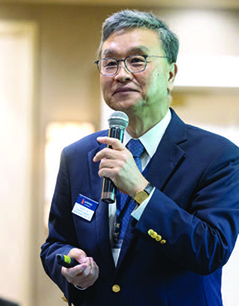
When primary students first start school, much of the learning is not just academics it involves learning how to be part of the school culture, from where to put your lunch tray to participating in after-school activities.
But what happens when a student moves to a new country where customs, protocol and language are all different from what they have learned?
“American teachers are on the front lines when students from a different culture enter a classroom,” said Daniel Dong Woo Yu, assistant director of Global Leadership Training for Auburn University Outreach. “If they understand their students from a cultural perspective, they can help ease the transition to American customs.”
For the past two decades — following the expansion of Korean automakers and suppliers into Alabama and Georgia — Auburn University Outreach’s Korea Corner has helped educators gain perspective on their Korean students who moved with their families. Since 2011, the Global Studies in Education: South Korea program has sent over 90 educators to South Korea to immerse them in Korean culture, society and education systems. They emerge with a better understanding of their Korean students’ perspectives and customs, as well as a path forward for connecting with their students.
Addressing educators’ need for cultural understanding
“Teachers were struggling to understand the behavior of their Korean students and wanted to know more about their culture, so they could help address the language and cultural barriers they were experiencing,” Yu said.
One example Yu related was that Korean students are expected to be very independent. In a Korean school, students may eat lunch alone and walk back to their classroom unattended. In American schools, students typically sit in groups and line up to transition from lunch to the next class.
 Todd Veland, principal of Southeast Bulloch Middle School in Georgia, meeting with students at Samsunghyun Elementary School.
Todd Veland, principal of Southeast Bulloch Middle School in Georgia, meeting with students at Samsunghyun Elementary School.
“We created the Global Studies in Education program specifically for educators to give them myriad experiences, so they come home with a better understanding of how to relate to the Korean families in their school communities,” Yu said.
In June, 15 educators and teachers from Bulloch, Evans and Candler counties in Georgia traveled to South Korea. In Gyeongsan, the group visited Samsunghyun Elementary School, Gyeongsan Science High School and Kyungil University to hear lectures and experience the Korean education system. Afterward, they immersed themselves in the culture of ancient cities including Gyeongju, Andong and Seoul, visiting museums, DMZ, historical sites and touring AJIN industries, one of the automakers that expanded to the U.S., bringing Korean families with it.
“As a citizen of a very individualistic society, I found it refreshing to experience the mindset of collectivist culture,” said Leah Hackle, an educator from the 2024 cohort. “The Korean people really seem to be conscious of contributing their individual part in making their country a better place. I am inspired and challenged to consider how I can cultivate more of that progressive ‘we’ culture I saw in South Korea within my own classroom.”
Brent Osborne was struck by the after-school programs, called hagwon. An estimated 78% of grade school students in South Korea attend the private after-school programs and spend an average of seven hours there per week.
“Their after-school programs are much more educational than what we have. They also have sports and extracurricular activities, but most students that are participating in these programs are receiving extra tutoring, music or creative and critical thinking activities,” said Osborne. “After seeing firsthand what they are about, I now see why Korean families place such a large emphasis on tutoring and enrichment activities when they move to America, because that is what is expected from just about every student in Korea.”
Teachers from the 2024 program gained ideas they hope to bring back to their schools.
“One significant take-away from my experience is the idea of implementing a student ambassador group in our schools,” said Bethany Gilliam, a 2024 participant and teacher in Bulloch County Schools. “Such a group could help assist new students as they enroll, fostering a more inclusive and friendly environment.”
A gathering to reflect and move forward
This November, the 90-plus educators who have experienced the Global Studies in Education program are invited to Auburn for a conference on Bridging Cultures through Education to reflect on the program’s impact in their local communities.
“The goal of the conference is to bring teachers from the Opelika and Auburn school districts together with the Georgia school district participants so they may share experiences, network and generate ideas they can implement in their classrooms,” said Jenny Lee, coordinator of Korea Corner.
Since the program’s inception, many donors have made it possible to offer Global Studies in Education free to participants. In 2024, AJIN INDUSTRIES, one of Hyundai Motor Group’s primary suppliers, generously donated $100,000 to fully fund the next cohort of Global Education Studies participants, ensuring that this vital program continues to reduce the cultural barriers between American educators and the Korean students in their schools.
“The Global Studies in Education program has made an enormous impact on educators in Alabama school systems and now in Georgia as well,” Yu said. “The cultural awareness participants gained from the program helped soften the barriers between the educators and the Korean parents and children. We hope to build on the momentum the program has created and continue to offer this outreach to our educators.”
 The Global Study Conference was held in November. The event brought together educators from Alabama and Georgia to share their experiences and insights on global education, with a focus on the impact of the Global Study Program.
The Global Study Conference was held in November. The event brought together educators from Alabama and Georgia to share their experiences and insights on global education, with a focus on the impact of the Global Study Program.

In 2020, a small group of writing friends, including Jay Lamar, Jennifer Horne, Katie Lamar Jackson, and Wendy Reed, found themselves in search of a project.
“We were getting to a certain age and thinking about its challenges, and we wanted to know how other women had navigated this period of life,” said Lamar.
So, they gathered a group of 21 women artists and writers with diverse backgrounds and experiences to share their perspectives in the book “Old Enough: Southern Women Artists and Writers on Creativity and Aging.”
These women candidly discuss aging with an eye toward the wisdom and acceptance it affords them. “Not everybody is lucky enough to get older and to be able to reflect on it as they experience it,” said Lamar. “Hearing from others who are in the same place in life helps us understand and appreciate what is good about it.”
This fall, the Osher Lifelong Learning Institute at Auburn University (OLLI) hosted some of the book’s contributors for public lectures and member seminars about the intersection of creativity and aging. Each week a different artist or writer led the audience in an exploration of identity, memory, resilience and the passage of time through their work. These experts led OLLI members in hands-on workshops to help them find and hone their creative expression.
Series presenters included writers Jacqueline Allen Trimble, Angela Jackson-Brown, Cecilia Rodriguez Milanes and Patricia Foster, curator Gail Andrews, world-renowned quilter Yvonne Wells, graphic novelist Lila Quintero Weaver, visual artist and sculptor Sara Garden Armstrong and former Alabama Poet Laureate Jennifer Horne.
Though not all from Alabama, the speakers all have roots in the South. “No matter where I am in the world, I will always be a Southern writer,” said Jackson-Brown. “It took nearly a lifetime for me to embrace that part of me in both my writing and my identity. The South is not just home. It is my muse; my inspiration.” OLLI’s mission is to enrich the lives of adults by providing opportunities for members to engage with ideas, one another and our community through courses, workshops and social interactions. Lamar said, “I’m excited about this time of life. Before the book, I was sort of dreading it, thinking ‘Here we are at the end of the line.’ But it’s so much more.” Supporting creativity is just one of the ways OLLI fulfills that mission.
In a world that often sidelines the voices of older adults, this series is a testament to the enduring value of creativity in every stage of life. “Now that I have become one of the seniors, I like it. You have none of the impediments of being younger,” said Trimble. “I don’t have to worry about pleasing anybody and it frees you to be more creative.”
As older adults start to make up a larger part of the population, they are seeking more ways to stay active and engaged. “I think people are becoming less afraid of growing older in some ways,” said Jackson-Brown. “Often in the past, we would have thought by the time you’re in your 50s or 60s or 70s or 80s you should be winding down. I think many of us are saying, ‘No, we’re just getting started.’”
The Old Enough series was supported by generous grants from the Alabama Humanities Alliance and the Alabama State Council on the Arts and a partnership with the City of Auburn. For more information about “Old Enough: Southern Women Artists and Writers on Creativity and Aging,” visit oldenough.org. To learn more about OLLI, please visit auburn.edu/olli.
Curiosity never retires.
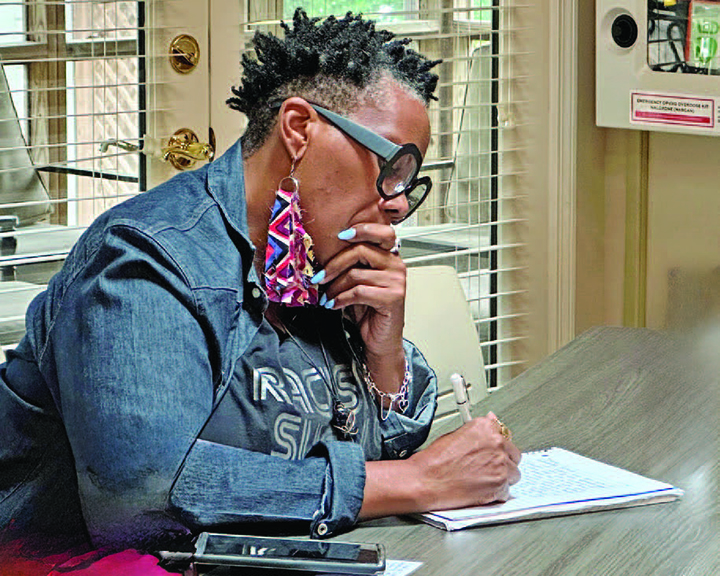 OLLI member engaged in writing project
OLLI member engaged in writing project
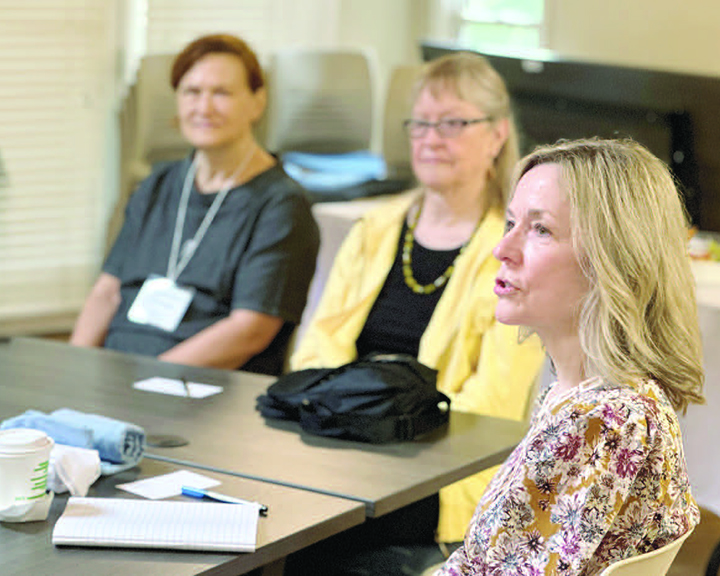 OLLI members discuss their ideas about creativity
OLLI members discuss their ideas about creativity
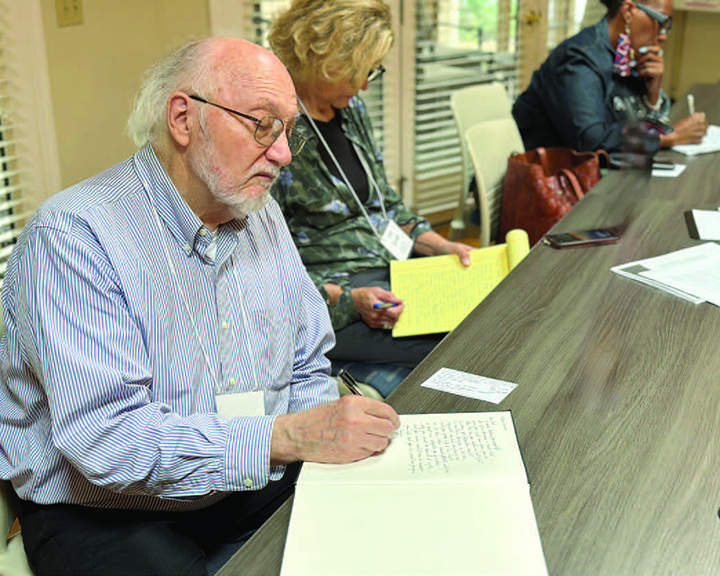 OLLI members work on writing projects
OLLI members work on writing projects
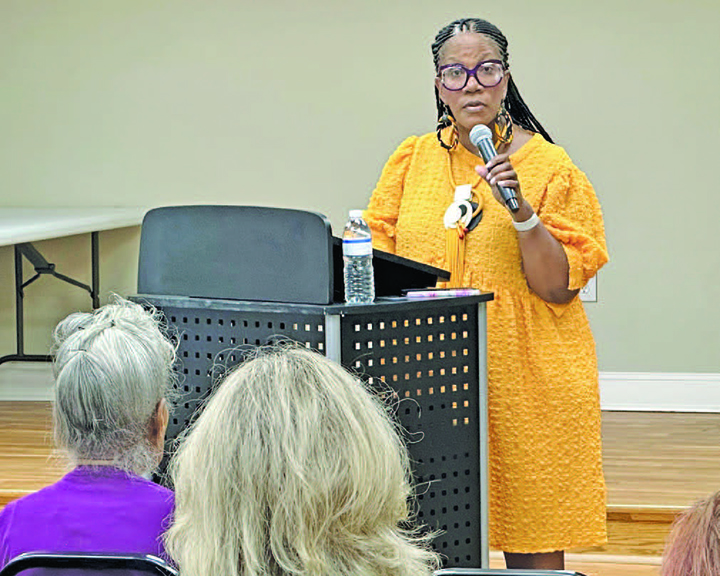 Author Angela Jackson-Brown speaks to the crowd
Author Angela Jackson-Brown speaks to the crowd
 OLLI at Auburn members in discussion
OLLI at Auburn members in discussion
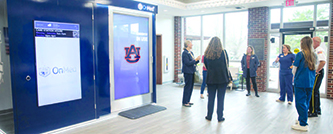 Chambers County Community Health and Wellness Center
Chambers County Community Health and Wellness Center
Access to health care is no longer an issue for people in two rural Alabama communities thanks to Auburn University’s expansion of its Rural Health Initiative footprint featuring the OnMed Care Station and in-person health and wellness services in Wilcox and Greene counties.
Auburn University Outreach, the Alabama Cooperative Extension System, and the Auburn Colleges of Pharmacy, Liberal Arts, Nursing, and Human Sciences, all partnered with community leaders to make these new installations possible as a vehicle to address Alabama’s health care access challenges effectively. The University of West Alabama is an exemplary partner in supporting internet services and key community collaborations. OnMed’s Care Stations are a pivotal component of this health care access model and are rapidly expanding across the state.
At OnMed stations, residents can experience affordable, private, real-time visits with Alabama-licensed health care professionals in a virtual setting at no charge. The new locations will provide opportunities for university students and faculty from different disciplines to support community members’ overall well-being as needs are identifed.
Wilcox County
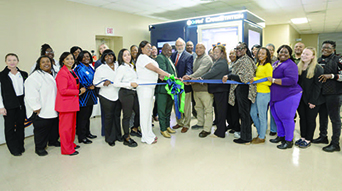 Catherine, Alabama (Wilcox County) grand opening.
Catherine, Alabama (Wilcox County) grand opening.
Shareka Johns, the county Extension coordinator in Wilcox County, said county commissioners were instrumental in setting up the station at the Shaw Community Center.
“This was a great need in our community,” Johns said. “The nearest hospital is 45 miles away, there is no obstetrician nearby, and the nearest doctor’s office is almost 45 minutes away. There is also a school nearby that will benefit greatly. Our citizens are so thankful that there is a place that can handle their needs in a timely manner.”
Greene County
Boligee, Alabama, Mayor Hattie Samuels said words cannot describe how grateful and excited she is.
“The OnMed Care Station is conveniently located in the Boligee municipal building and is the first stop for each person who enters,” Samuels said. “You can see the praise on the faces of our senior center members as they visit the OnMed Care Station for demos. This service will not only benefit the town of Boligee but will also have a lasting impact on surrounding communities.”
Samuels continued. “Many senior citizens are unable to get to a medical facility without hiring someone to drive them. This makes access to health care physically easier and cuts down on the wait and travel time it takes to be seen at a doctor’s office.”
Samuels said Boligee is a retirement town that needed something new and exciting to wake up members of the community.
Partnering with Purpose
Dr. Royrickers Cook, Vice President for University Outreach and Associate Provost, envisioned this increase in health care access just before the COVID-19 epidemic began paralyzing rural Alabama communities.
Cook said, “The OnMed Care Station was introduced as a tool to increase health care access for underserved areas. We saw this as a bridge between rural communities, primary care providers, and specialists in nearby areas. Our faculty and students engaging with these communities elevates the experience and impact for all.”
Alabama Extension Director Mike Phillips said the opportunity to change lives through health care access is not something that the Extension system takes lightly.
“Since the success of the Chambers County OnMed Care Station, we are well-poised for the same positive impact across Greene and Wilcox Counties,” Phillips said. “We are proud to be partners in this effort, the ability to shift the health care landscape in more rural counties is a wonderful thing.”
Hollie Cost, assistant vice president for Auburn University Outreach and Public Service, said the collaborative team is thrilled with the opportunity to support the health of the Greene and Wilcox County communities.
“Our team is thrilled that so many interested parties have come together in support of the health of communities across Alabama,” said Cost. “Based on direct feedback from community members, we know there is a need for greater access to health care, as well as health and wellness programming and information during extended hours.”
OnMed CEO, Karthik Ganesh reinforced Cost’s sentiment. “Partnership is key to this success in Alabama. Our relationship with the Auburn University Rural Health Initiative has blossomed to include champions from across the state. It is gratifying to see the OnMed Care Station become core to Alabama’s public health infrastructure.”
More Information
The first OnMed Care Station sponsored through Auburn University is located in Chambers County. This project is being supported in part by a federal award given to the State of Alabama by the U.S. Department of the Treasury.
About OnMed®
OnMed is the premier tech-enabled hybrid care company partnering with public and private organizations to reimagine health care access and improve health equity in communities across the country. With its patented Care Stations, OnMed blends the traditional clinician-patient experience with innovative technology in a convenient clinic-in-a-box that can be installed anywhere there’s an outlet, bringing affordable, convenient care to underserved communities by meeting them wherever they are. OnMed is actively building commercial partnerships across multiple markets including government and public entities, payers, provider systems, large employers, colleges and universities, and high-traffic venues.
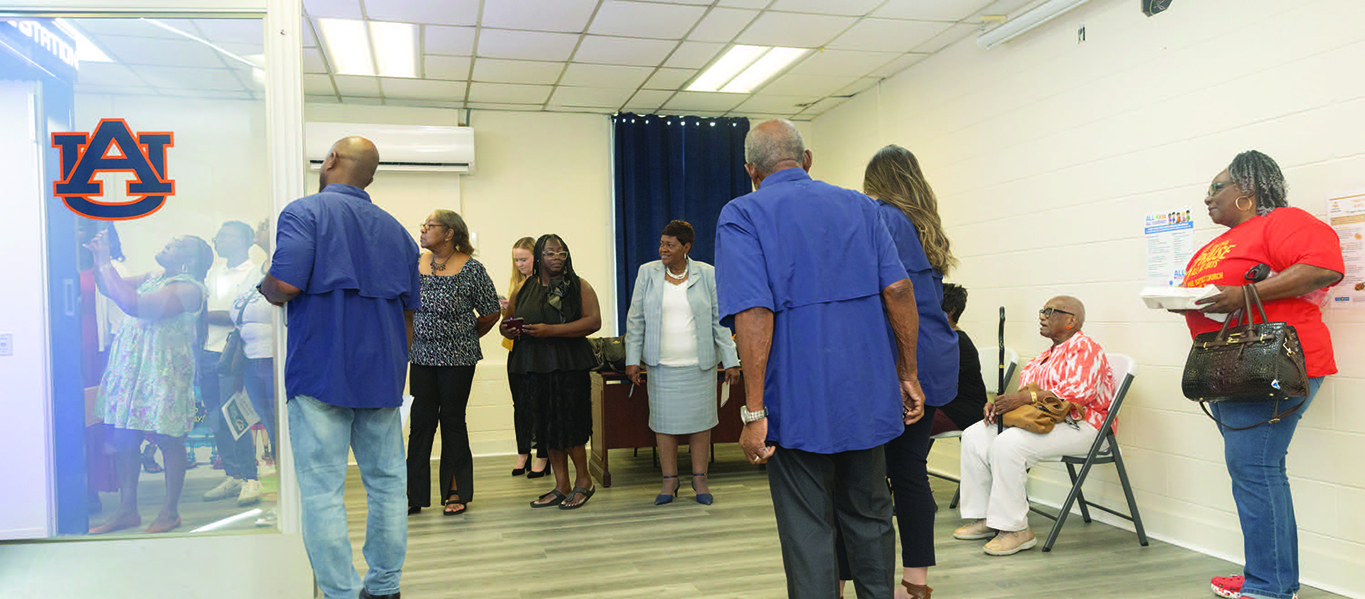
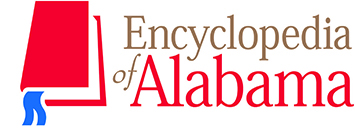
Over the past year, people in Alabama’s capital city have generated more than 33,000 visits to the online Encyclopedia of Alabama (EOA). It is likely that more than one staff member at the Alabama Department of Archives and History (ADAH) will humorously claim credit for at least half of that count. ADAH, which is located across from the capitol building in Montgomery, has been the home of Alabama history since 1901, when it was founded as the nation’s first publicly funded, independent state archive agency. EOA, which is administered by University Outreach, launched in 2008.
For 125 years the ADAH staff has been collecting and preserving the historical materials of the people of Alabama. These collections are also used to share the state’s stories in exhibits and educational resources. EOA, the premier online reference resource on Alabama’s history, culture, and natural environment, is one of the resources the ADAH staff regularly relies on to execute its award-winning work.
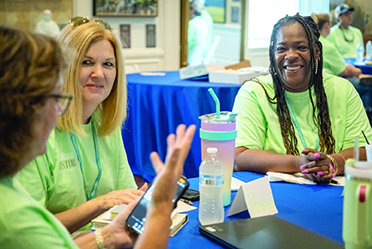 Alabama Department of Archives and History (ADAH) - Alabama History Institutes in Mobile.
Alabama Department of Archives and History (ADAH) - Alabama History Institutes in Mobile.
Across ADAH’s departments, from the registrar’s office—where new artifacts and other acquisitions officially enter the collections—to the teams that create exhibits, programs, and outreach activities for students and educators, EOA is a frequently used resource. “In house, EOA is the authoritative source for Alabama history,” said Meredith McDonough, digital assets coordinator at the archives. “It is our go-to resource.” Scotty Kirkland, the exhibits, publications, and programs coordinator, said, “EOA is one of our most trusted and relied upon resources when creating exhibits and publications.”
McDonough, who has been with ADAH for 18 years, became aware of EOA – before the site launched – when she started providing photographs and other digital images from ADAH’s collection that illustrate EOA’s articles. She also uses it for her own projects. “When we digitize materials, we also describe them so they can be found and understood, the metadata that accompanies the documents,” she said. McDonough noted, “It is always such a relief and thrill when there is an EOA article that is relevant to some item that we’ve digitized, because I know it is a place I can go to get some good solid information to start with.”
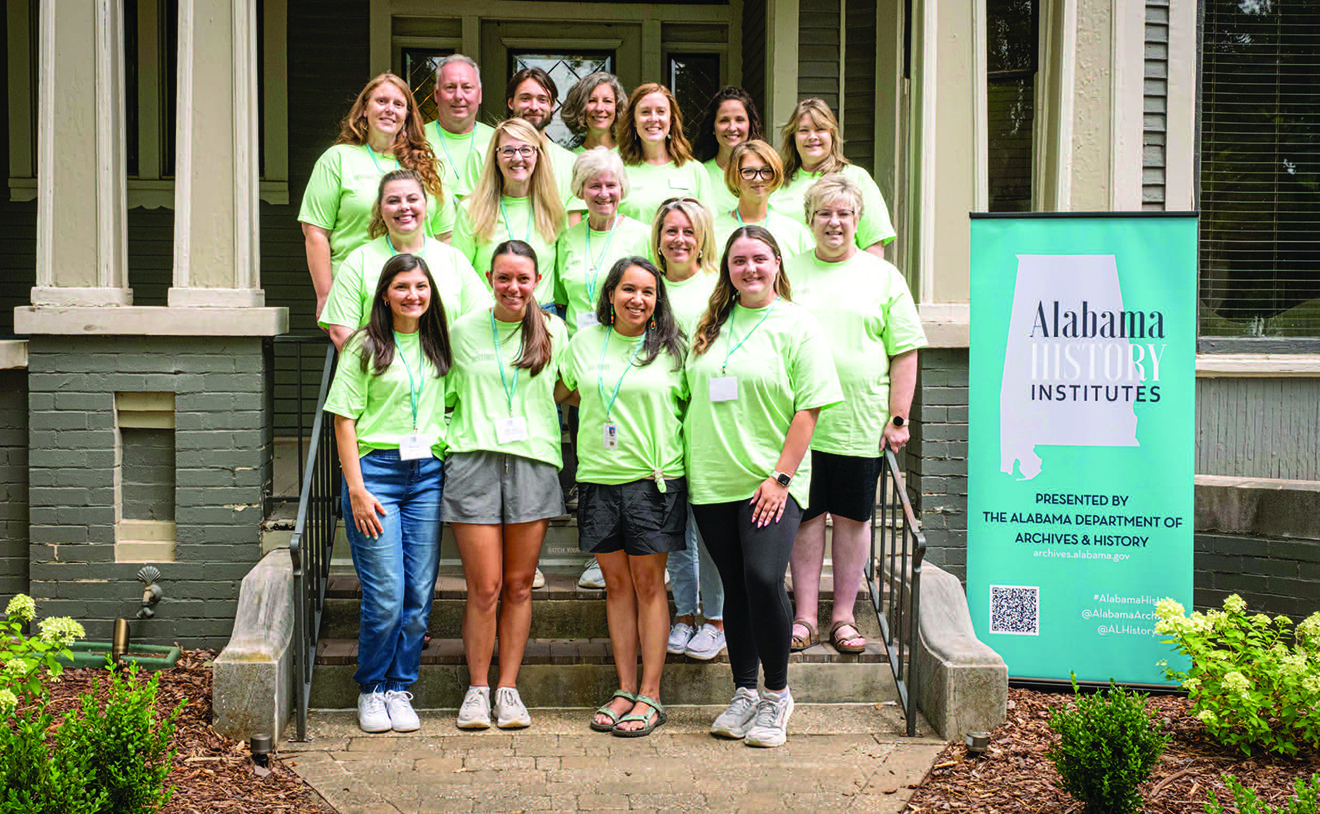 Alabama Department of Archives and History (ADAH) - 2024 Alabama History Institutes in Florence, Alabama.
Alabama Department of Archives and History (ADAH) - 2024 Alabama History Institutes in Florence, Alabama.
In addition to using EOA for developing metadata, the digital assets team uses its content to enhance ADAH’s online offerings, especially the “Alabama Fast Facts” pages. “Rather than staff writing entries, we link to EOA articles,” said McDonough. Links to EOA’s content are used on the pages about counties, state emblems, and governors. EOA is also used in the lesson plans that ADAH offers to teachers through its online “History Hub.” That resource supports teachers with a database of Alabama history primary sources, curated lesson plans, and activities for K-12 classrooms.
Some of EOA’s most enthusiastic supporters have been members of ADAH’s education team. Hayden McDaniel, an education curator, started working with history teachers during the Alabama bicentennial celebrations. She was on the team that delivered professional development at multi-day summer sessions across the state. Through those workshops more than 1,000 Alabama teachers were introduced to EOA. The workshops continue today as “Alabama History Institutes,” an ADAH program that offers immersive professional development opportunities in history and civics for all public, private, and homeschool K-12 educators in Alabama. McDaniel manages the program and continues to enthusiastically share EOA with participants. In September 2024, the American Association for State and Local History presented an Award of Excellence, its most prestigious award, to ADAH in recognition of the program’s success. (ADHA was also presented a second excellence award for its series of panel discussions named “History/Now: Conversations on the Past + Present.”)
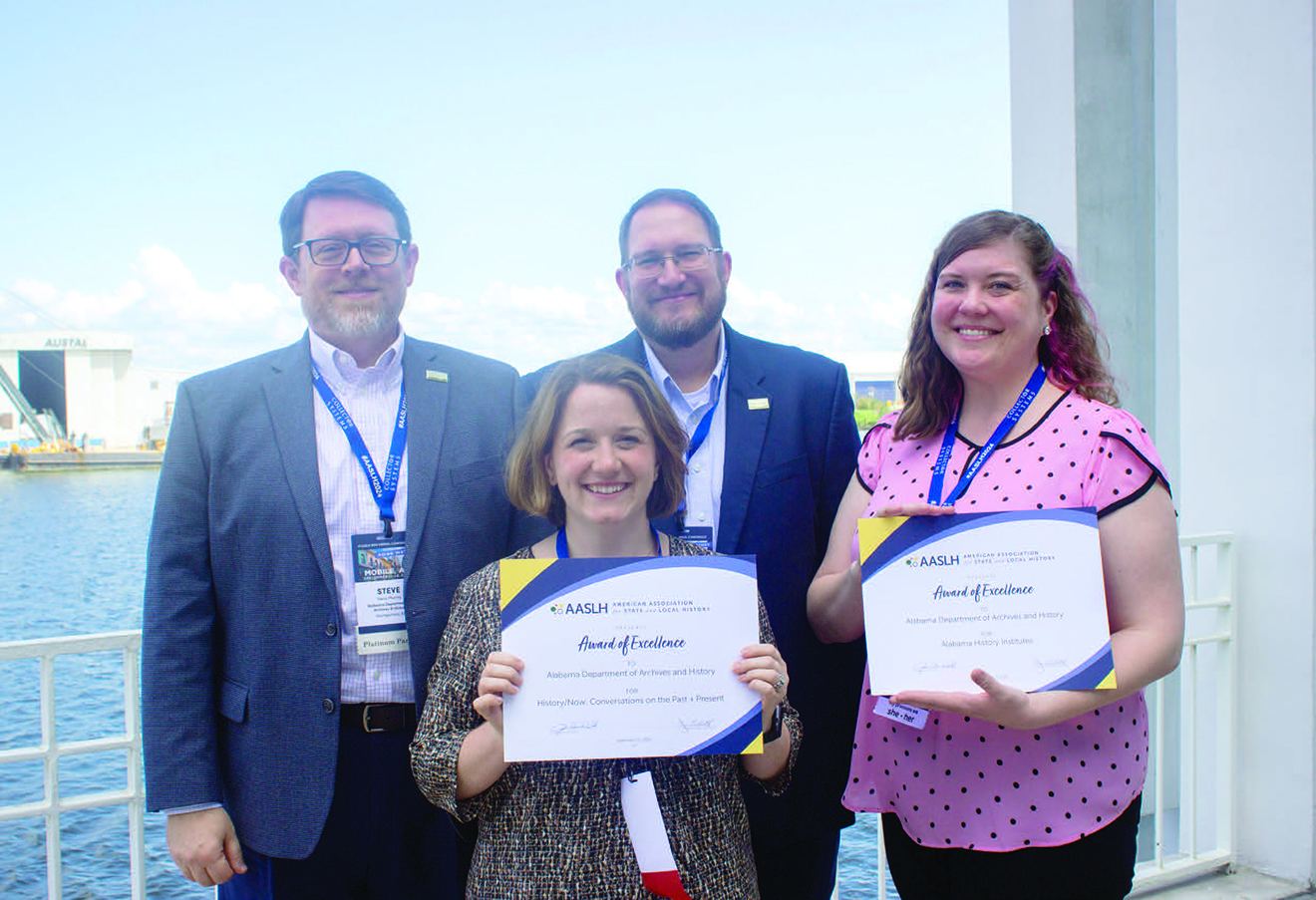
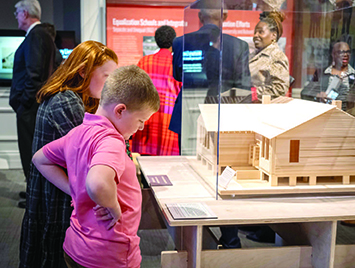 Alabama Department of Archives and History (ADAH) - Rosenwald exhibit
Alabama Department of Archives and History (ADAH) - Rosenwald exhibit
driving goal for McDaniel is to make sure teachers “aren’t intimidated by doing the work of history.” Her efforts to engender confidence include creating awareness of what are primary sources, where to find them, and how to use them. This work shows up in the primary source packets that are available to teachers, for free, through “History Hub.” Most of these packets share links to relevant EOA articles. “We link it to EOA because providing context for those material is crucial,” said McDaniel. She noted that in addition to helping teachers find resources that support the teaching standards they work with, the packets help them understand the period and the gravity of the concepts covered.
EOA’s usage by ADAH staff isn’t limited to links to its digital offerings. Members of the reference department and the teams that create exhibits, publications, and programs also regularly utilize EOA’s content. Scotty Kirkland said, “Simply put: We know we can trust the content on EOA, so we use it often to help formulate our work.” He added, “Having written more than a dozen entries, I have firsthand knowledge of their rigorous editorial procedures.” (Kirkland has written 16 EOA articles to date.) Senior reference archivist Kayla Scott Gurner, who has also written 16 articles for EOA, said, “I can’t count the times that something I’ve written about trickles over into something that I am doing as part of my job. It gives me a unique perspective on a number of different topics.” Both Kirkland and Gurner wrote for EOA when they were graduate students. Gurner noted, “I have been writing for EOA longer than working for ADAH.” She added that writing for EOA introduced her to resources, ideas, and information that she otherwise wouldn’t have come across, which helps her with her job. Kirkland echoed that benefit when he said, “Students, fellow scholars, and the public have seen my entries on the site and connected with me, in some cases furthering my research into a topic and giving me new perspectives.”
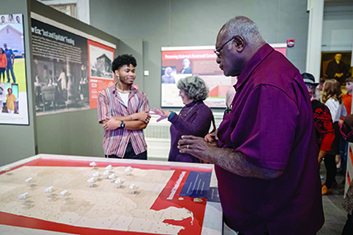 Alabama Department of Archives and History (ADAH) - Rosenwald exhibit
Alabama Department of Archives and History (ADAH) - Rosenwald exhibit
The exhibits, programs, and online resources offered by ADAH revolve around its physical collections. And that is where Haley Aaron, the institution’s registrar, has a role. Her office is tasked with the responsibility of evaluating what stories can be told with the artifacts or archival materials that are offered as donations. “How EOA is great for me and the assistant registrar is that often things come in without a lot of context,” Aaron said. “We’ll get a collection about something like coal mining in Alabama. We’re not experts on coal mining, but we can quickly go to EOA and find an article that gives us this really fantastic big picture of the types of resources we are looking at. EOA helps us contextualize the collections coming into the building and provide a better understand their significance.”
“Another thing I love EOA for is helping the people donating to our collection understand how their family stories are connected to Alabama history,” she said. “A lot of times I’m able to point them to articles in EOA and it offers them such a great way to connect their family stories and their community stories with the larger story of the state.”
The Encyclopedia of Alabama is a free, online reference resource on the state’s history, culture, and natural environment. It was created in partnership with Auburn University and the Alabama Humanities Alliance. Visit it at EncyclopediaofAlabama.org.
When a camp designed to strengthen the families of seriously ill children is interested in managing its duck population, serving children with autism and managing its fruit orchard, the camp naturally turns to Auburn University. Chief executive officer of Children’s Harbor, Cat Outzen recognized the extensive possibilities at their fingertips. After Outzen expressed interest in working with Auburn University, Linda Gibson-Young, nursing faculty and Asthma Camp director, facilitated a meeting between Outzen and Auburn University Outreach to develop a mutually beneficial relationship.
 Children’s Harbor’s Cat Outzen, CEO, and Vicki Tuggle, COO, visited Auburn University’s Commercial Interior Design classes to discuss the exciting potential of reimagining their Lake Martin campus. The class shared insights on the do’s and don’ts of creating inspiring and functional spaces. Professor Anna Ruth Gatlin facilitated the connection.
Children’s Harbor’s Cat Outzen, CEO, and Vicki Tuggle, COO, visited Auburn University’s Commercial Interior Design classes to discuss the exciting potential of reimagining their Lake Martin campus. The class shared insights on the do’s and don’ts of creating inspiring and functional spaces. Professor Anna Ruth Gatlin facilitated the connection.
Since the initial meeting in April 2023, University Outreach has hosted two faculty trips to Children’s Harbor and continues to sponsor campus-based meetings to maintain this momentum. These meetings and ongoing communications are evolving into a multi-disciplinary program engaging faculty and students from various schools and colleges to work with staff and patients at Children’s Harbor.
Outzen realizes the give-and-take nature of the relationship. “There will be times when arrangements benefit one party more than the other, and some are equally beneficial,’ said Outzen. “We are committed to embracing these opportunities and continue building on them.”
One element of the partnership is with the Department of Nutritional Sciences in the School of Human Sciences. Children’s Harbor is providing placement for twelve master’s level interns in nutritional sciences this summer. The interns will work eighty hours during camps providing nutrition counseling and other activities.
The College of Architecture, Design and Construction is actively engaged in the partnership. In 2025 Interior Design students will host a one-day workshop on campus to discuss ways to retrofit the Harbor Lodge Conference Center for better acoustics, lighting, entrances, and airflow. The students are looking at the serving area in the Harbor Lodge Conference Center to make it welcoming and efficient. Children’s Harbor is providing up to $5,000 while the students are gaining firsthand experience implementing their ideas. The Commercial Design Studio class is reviewing ways to maximize space in the Lake Administrative Office. In addition, the Architecture faculty has secured a topographical survey of the property to prepare for an experimental planning course.
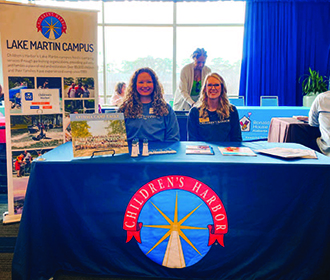 Lake Martin staff at the 6th Annual Cary Center Nonprofit Meet Me at the VIC - Volunteer, Internship, and Career Fair! Children’s Harbor staff had the chance to interact with Auburn students who are interested in volunteer opportunities, internships, and careers in the nonprofit sector.
Lake Martin staff at the 6th Annual Cary Center Nonprofit Meet Me at the VIC - Volunteer, Internship, and Career Fair! Children’s Harbor staff had the chance to interact with Auburn students who are interested in volunteer opportunities, internships, and careers in the nonprofit sector.
Another project that both entities are excited about is the clinical affiliation agreement signed between the College of Nursing and Children’s Harbor. The agency’s facility will serve as the clinical laboratory for the Auburn students. Children’s Harbor will retain full responsibility for the care of patients and will maintain administrative and professional supervision of students, as far as their presence affects the operation of the clinic and the care of patients. In return, Auburn University will provide faculty for the necessary instruction and supervision of its students while on assignment in the agency to ensure the students’ proper utilization of nursing principles and theory during the practice of nursing.
Auburn faculty members from several disciplines are helping to determine metrics and data collection on the efficacy of our programs at both the Lake and Family Center. Disciplines include counseling, psychology, early childhood education, kinesiology and social work. A pilot project started in the fall in the endocrinology clinic to gauge the effects of our counseling program on caregivers. A second pilot project starts in the spring of 2025 to gather qualitative information on resources and programs families need.
In addition to these noted projects, numerous possibilities for additional alliances are under discussion. The critical care that Children’s Harbor provides to patients and their families can be enhanced by the partnership, and Auburn University students are gaining firsthand experience that cannot be replicated in the classroom making this an ideal mutually beneficial relationship.
Founded in 1989 as a nonprofit organization, Children’s Harbor strives to serve children with serious illnesses and their families. The Lake Martin Campus was created to provide a camp at no cost for families navigating the challenges that accompany the diagnosis of a serious illness or disability. The agency recently received a generous donation of an additional 39 acres enabling the camp to expand geographically and programmatically, thus laying the groundwork for this growing partnership. For additional information visit, childrensharbor.com.

Build synergistic partnerships where Auburn’s strengths contribute to and are complemented by strategically selected industries, organizations, research centers and institutes, universities, and governmental and non-governmental entities.

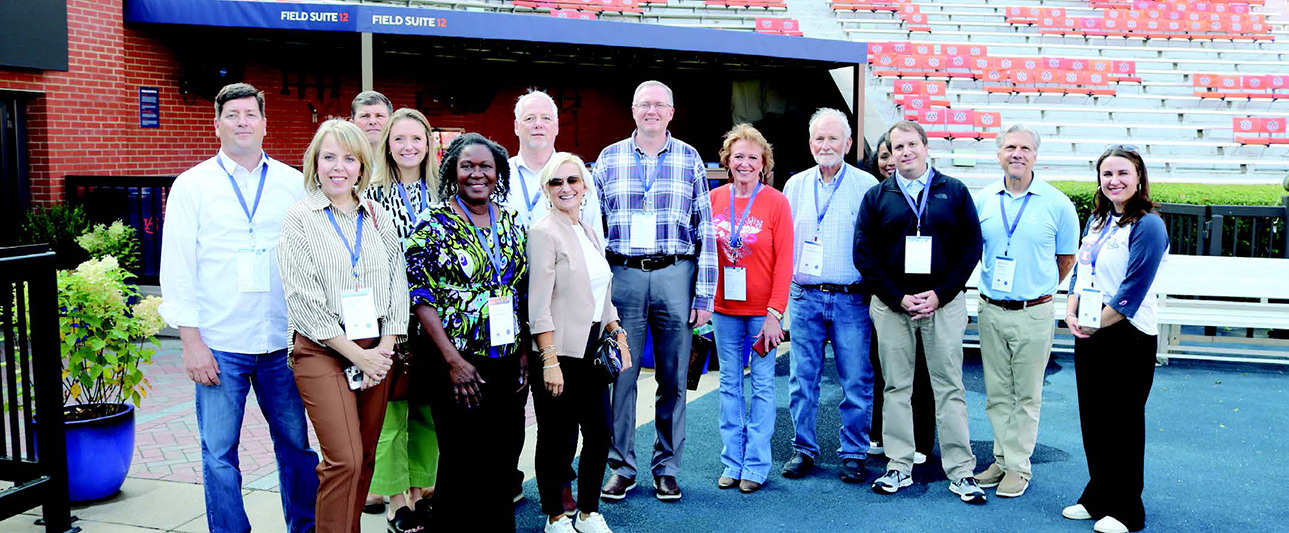 Intensive Economic Development Training Course alumni toured Jordan-Hare Stadium during the reunion.
Intensive Economic Development Training Course alumni toured Jordan-Hare Stadium during the reunion.
In September 2024, the Government and Economic Development Institute (GEDI) completed the 40th Intensive Economic Development Training Course. Since its inception, 1,700 participants have completed the program. These graduates include economic development professionals, chamber of commerce staff, elected officials, community leaders, utility company representatives, community and regional planners, workforce development professionals, business owners, executives and entrepreneurs.
In 1984, there was no official state training course or guidebook to teach economic developers to improve local quality of life, attract and retain businesses and jobs or spur economic growth and development. The Industrial Development Association of Alabama (IDAA), now the Economic Development Association of Alabama, initially approached the University of Alabama with an idea to develop a statewide economic development education program. When Alabama turned down this proposal, Wilson Lee, an Extension economist at Auburn University, took on IDAA’s request and obtained a large federal grant to initiate the program.
The Intensive Economic Development Training program was established as two one-week sessions, and the first class was held in 1985. It was designed to equip participants with the background and tools to develop a successful strategy for building communities and sustaining long-term economic growth. Forty years later, the program has accomplished this goal as Alabama communities are thriving and growing under the leadership of Intensive graduates.
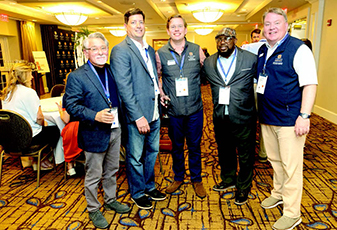 Past and present GEDI leadership
Past and present GEDI leadership
The first week of the Intensive Course is accredited by the International Economic Development Council (IEDC) and Spire Energy signed on in 2018 as the presenting sponsor. Instructors for Intensive represent some of the most experienced subject matter experts in all facets of economic and community development.
October 28-30, 2024, GEDI hosted a successful Intensive Course alumni reunion. Over 100 course alumni returned to network, learn, enjoy unique Auburn experiences and continue to deepen their professional knowledge and connections.
Lorie Denton, director of CREATE, a regional workforce development, technology and innovation center in East Alabama was among the participants. “I’m so glad to be back. These are my people,” said Denton. “The Intensive program provided a great foundation for me, and I use what I learned and the connections I made here all the time.”
Another participant, Phillis Belcher, of Greene County Industrial Development Authority, credits much of her success to the relationships she formed during her time in the course in 1994. “There is a lot of work that happens behind the scenes that can take many years to come to fruition,” said Belcher. “Relationships and collaborations are key to any economic development improvements or wins.”
Don Smith, of the St. Clair County Economic Development Council, admitted, “I would not be in the position I am currently in without the connections I made by attending this course. I am still in contact with many of those who attended the class with me in 2005 and the speakers and instructors. I work with some of them monthly.”
The reunion featured educational sessions that looked back on economic development wins for the state of Alabama, including locating businesses like Mercedes, Hyundai, Novelis and Airbus, and game-changing recreational investments like the Robert Trent Jones Golf Trail. Participants got to peek behind the curtain and learn from the key players in each project to understand the details, resources, partnerships and timelines necessary to bring these projects to life in Alabama. They also learned about growth strategies, trends, demographics and potential economic development opportunities.
Participants toured Jordan-Hare Stadium, the Rane Culinary Arts Center, New Realm Brewing Company and the Jule Collins Smith Museum in addition to attending a luncheon and several receptions. The group even enjoyed a visit from Aubie, an educational session with staff and birds from the Raptor Center, Toomer’s lemonade and treats from Hey Day Market.
The popularity of the Intensive Economic Development Training Course continues to increase, and the class fills up every year. Those wanting to attend the program should reserve a seat early. The 2025 dates are scheduled for July 14-18 and September 8-11. For more information or to register, visit auburn.edu/outreach/gedi/intensive.
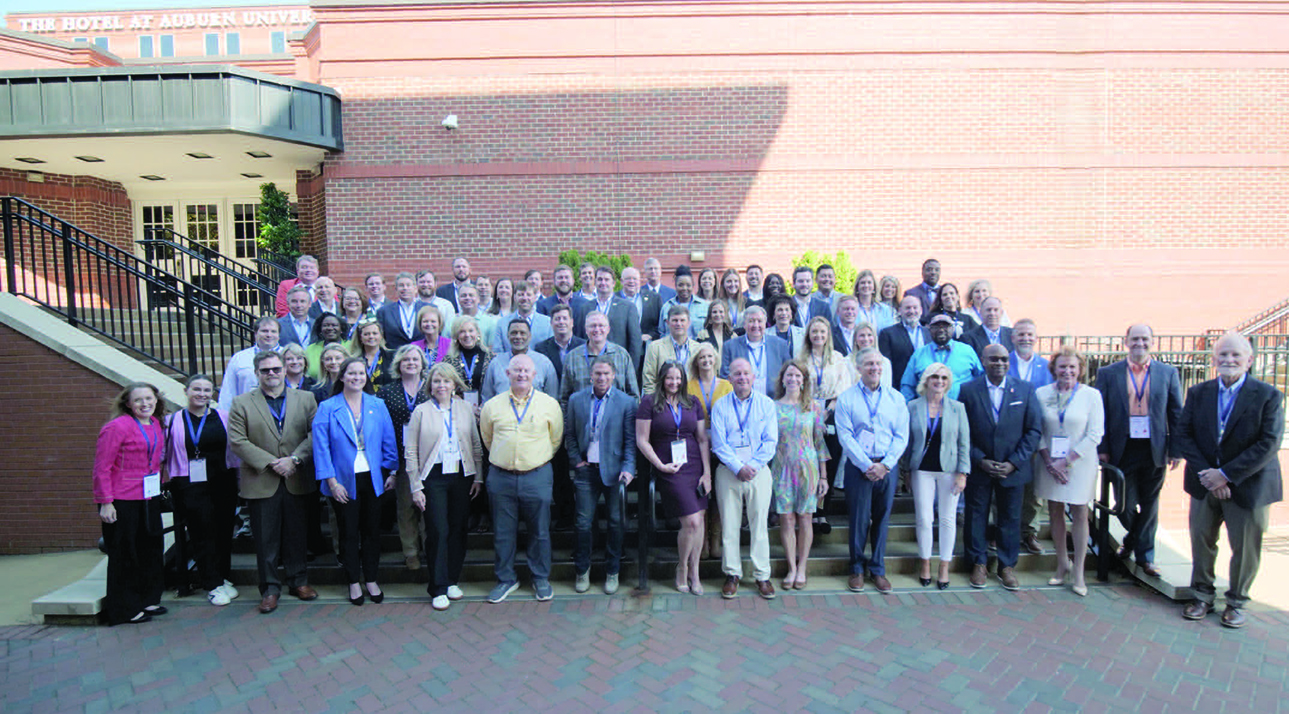 Intensive 40th Reunion
Intensive 40th Reunion
Three Auburn Harrison College of Pharmacy (HCOP) students are paving the way to address unmet health needs for communities across Alabama.
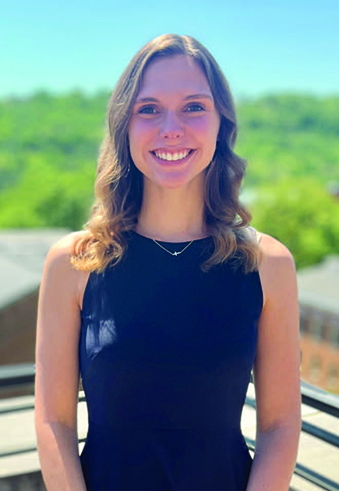 Pharmacy student, Erin Utz
Pharmacy student, Erin Utz
Erin Utz, Keila Adams and Autumn Edwards were selected to participate in the Alabama Schweitzer Fellowship program – a 15-month program devoted to developing community health projects. The Schweitzer Fellowship began in 2015 to provide students in Alabama the ability to make a difference in their selected populations.
Utz, from Cumming, Georgia, is a member of the Class of 2027 and is being mentored by Jeanna Sewell, associate clinical professor in the Department of Pharmacy Practice. To Utz, this opportunity means more than just a one-year experience.
“We, as fellows, have the opportunity to develop and implement a community service project and gain skills that we can use to develop and lead future service projects beyond the fellowship,” said Utz. “The fellowship may only be for a year but the impact on the community will last a lifetime.”
Utz is partnering with Mercy Medical Clinic to develop better access and adherence to medications. The clinic specializes in aiding uninsured and underserved patients, and Utz is working to expand the medication supply so more patients can receive their prescriptions at no cost.
“My finalized project involves multiple parts, including patient counseling, finding additional medication suppliers and distributing discount cards,” said Utz. “The project is more in the implementation stage now and specifically working on patient counseling. We have decided to specify counseling to patients starting new medications, taking blood thinners and/or statin therapy.”
Utz is bringing her project back to Auburn by creating volunteer opportunities for HCOP organizations to educate patients on their medical conditions and medications.
“For the past couple of weeks, I have had other pharmacy students volunteer to counsel patients,” said Utz. “This project and experience are teaching me the detailed steps that go into developing a service project.”
Adams and Edwards, both members of the HCOP Class of 2026 on the Mobile Campus, have partnered together to tackle the stress and anxiety brought on by being an early college and international baccalaureate (IB) student in high school. The pair has partnered with Murphy High School in Mobile, Alabama, to develop programs that focus on managing time, self-care and coping skills prior to students’ postgraduation plans.
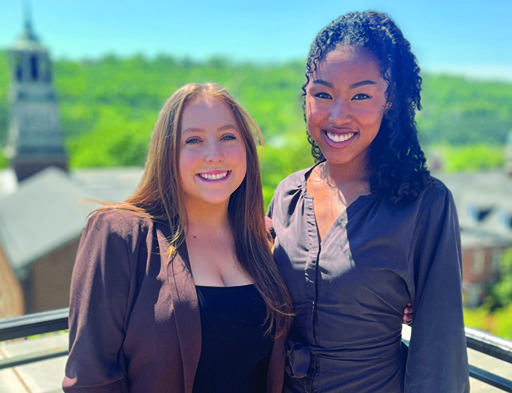 Pharmacy students, Autumn Edwards and Keila Adams
Pharmacy students, Autumn Edwards and Keila Adams
“We are grateful to have a passion project that we get to express ourselves through while handling all the responsibilities of pharmacy school,” said Adams. “As future pharmacists, these skills in addition to our growing abilities in teaching others and leading a project, and our knowledge surrounding mental health will continue to benefit us throughout our career. We couldn’t be more grateful for all that we have learned thus far, and we are confident that this fellowship will only continue to benefit us and the students we are teaching.”
Adams and Edwards are mentored by Kristen Korankyi, assistant clinical professor in the Department of Pharmacy Practice, and Rebecca Mullins from Murphy High School. Together, they have finalized the project “Breathe, Believe, Achieve.”
While students can complete their Schweitzer Fellowship projects solo, Edwards and Adams decided that working together is in their best interest.
“Navigating the development of a project from the ground up is tough, but as a pair we have been able to utilize our different strengths and keep each other motivated through the process,” said Edwards. “We have bounced ideas off each other, tackled all the responsibilities together and collaborated on this entire process.”
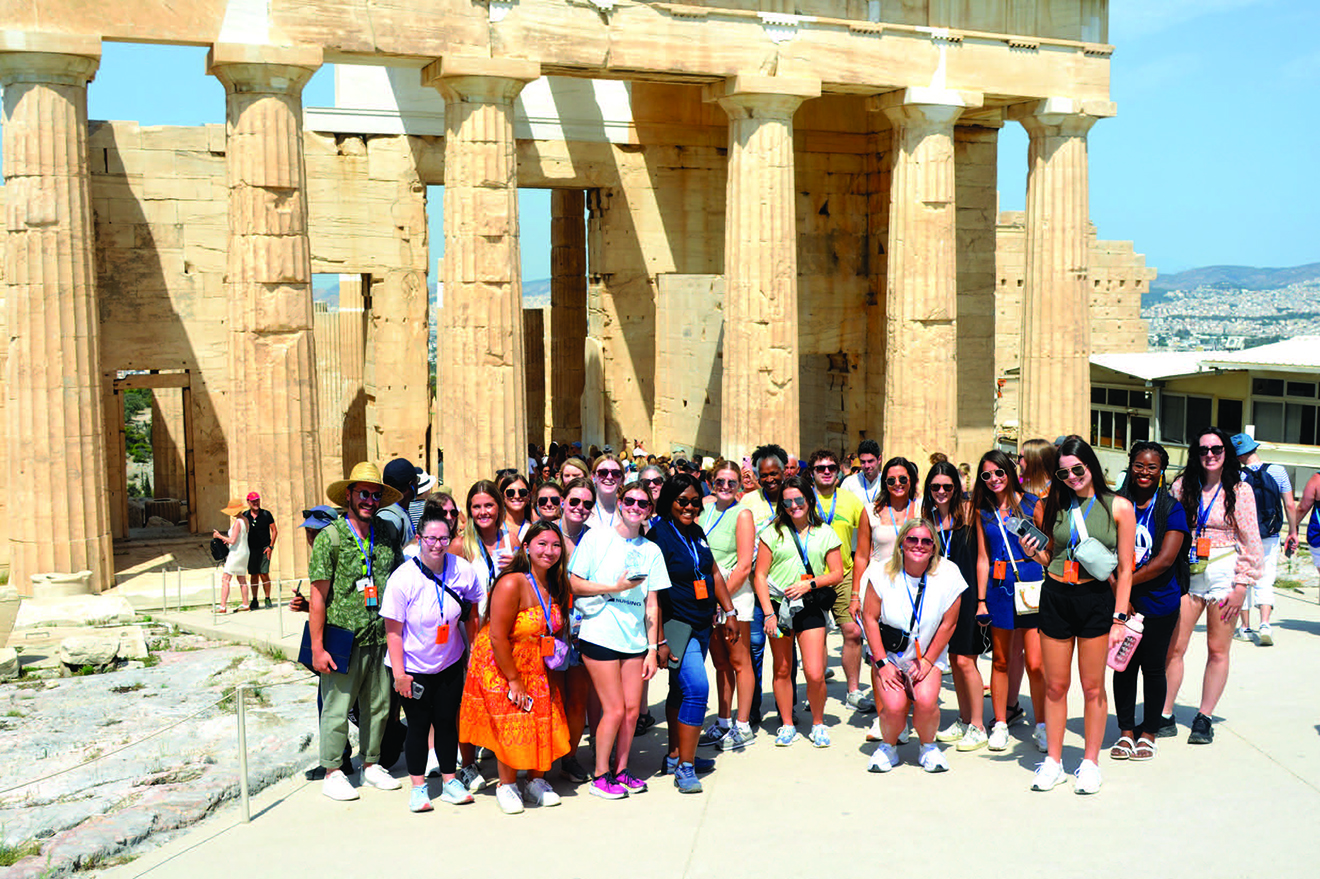 Greece Service-Learning Program participants in front of the Acropolis during a cultural excursion.
Greece Service-Learning Program participants in front of the Acropolis during a cultural excursion.
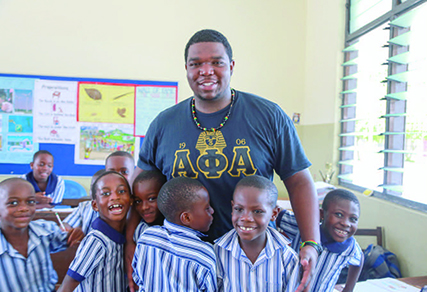 AU student shadows and teaches in a classroom during an Outreach Global Ghana Service-Learning Program.
AU student shadows and teaches in a classroom during an Outreach Global Ghana Service-Learning Program.
The Auburn University Office of Outreach Global looks forward to revitalizing its annual Ghana Service-Learning program in June 2025. The two-week program will have several service-learning opportunities, providing participants the opportunity to contribute meaningfully to local Ghanaian communities while gaining real-world learning experiences.
Program participants will engage in various service-learning activities, including hands-on healthcare service-learning at a local clinic in Ghana, working alongside community health professionals to serve local citizens. During Outreach Global’s previous Ghana Healthcare Service-Learning Program in 2020, students helped provide medical assistance to over 1,400 local patients. This summer, students will have the chance to continue this mission, contributing to the improvement of healthcare access and quality in the region.
Students will also shadow and teach in local schools through education service-learning or participate in agriculture and social work service-learning by supporting local nonprofit organizations with various initiatives and programs.
 AU pharmacy students and faculty member Allison Chung dispersing medication during Outreach Global’s Ghana Healthcare Program.
AU pharmacy students and faculty member Allison Chung dispersing medication during Outreach Global’s Ghana Healthcare Program.
In addition to the service-learning sessions, program participants will explore Ghanaian history and culture through organized museum visits and cultural excursions, including visits to the Cape Coast Slave Castle, Ghana’s Independence Square, the Kwame Nkrumah Museum and other national sights. Participants will also learn to dress in traditional Ghanaian attire, enjoy dance lessons, visit local markets and more. To learn more about the Ghana Service-Learning Program and apply for the 2025 program, visit auburn.edu/outreach/global/ghana-sb.htm.
In addition to the Ghana program, Outreach Global is organizing its upcoming Greece Service-Learning Program, scheduled for March 7-15, 2025. Participants will engage directly with local Greek communities and volunteer with various nonprofits in Athens. Participants will also tour cultural sites such as the Acropolis, Parthenon and the Panathenaic Stadium. For more information about the Greece program, visit aub.ie/OGgreece.
Through Outreach Global’s Ghana and Greece Service-Learning Programs, the office will continue its mission of providing positive change through service-learning initiatives, all while advancing Auburn students’ cross-cultural learning and understanding. Outreach Global programs are open to students, staff/faculty, alumni and community members. For information about other upcoming Outreach Global programs, visit auburn.edu/outreach/global or contact outrglb@auburn.edu.
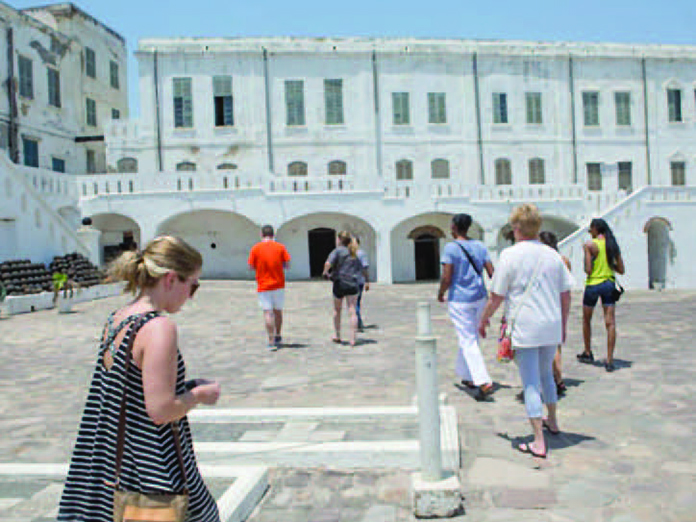 Participants of the 2018 Ghana Service-Learning Program at the Cape Coast Slave Castle – one of the many cultural immersion opportunities offered through the Ghana program.
Participants of the 2018 Ghana Service-Learning Program at the Cape Coast Slave Castle – one of the many cultural immersion opportunities offered through the Ghana program.
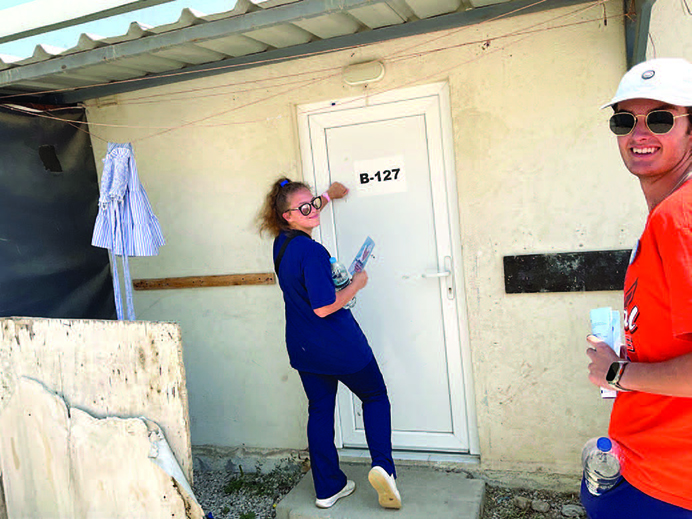 Greece Service-Learning Program students go door to door at a refugee camp outside of Athens, dispersing important medical information.
Greece Service-Learning Program students go door to door at a refugee camp outside of Athens, dispersing important medical information.
During the final year of school, Harrison College of Pharmacy students complete eight five-week advanced pharmacy practice experiences (APPEs) as part of the Doctor of Pharmacy curriculum. Of those APPEs, three are electives that allow students to focus on specific areas of pharmacy practice and personal interests.
In 2022, the Harrison College of Pharmacy (HCOP) collaborated with the Alabama Pharmacy Association (APA) to develop an elective APPE in professional organization and advocacy. Bobby Giles, a member of the HCOP Class of 1992, serves as the APA’s director of Government Affairs and is the preceptor for this experience.
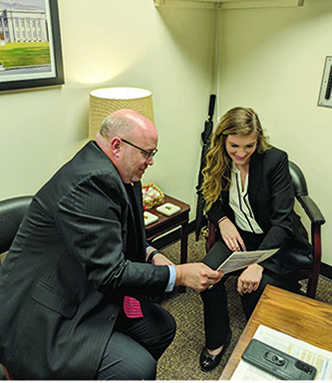 Katie Couture, Rep. Phillip Rigsby review document.
Katie Couture, Rep. Phillip Rigsby review document.
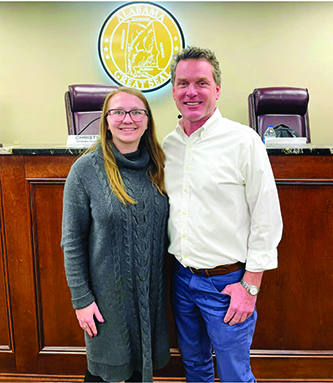 Amber Peacock, Bobby Giles
Amber Peacock, Bobby Giles
“This rotation is a fantastic experience and provided me an opportunity to learn concepts about the field of pharmacy that I did not even know existed,” said Amber Peacock, a member of the HCOP Class of 2024. “While I learned about the Alabama Pharmacy Association and all the hard work that goes into everything the association does for pharmacists, I also gained firsthand experience in advocating for pharmacists at the state level.”
Established in 1881, the APA is the oldest professional organization for pharmacy in the state. It represents members from all pharmacy practices who are committed to their profession and their patients. The organization offers continuing education programs for pharmacists and technicians, and its members take a leading role in lobbying for pharmacy at the state and national levels.
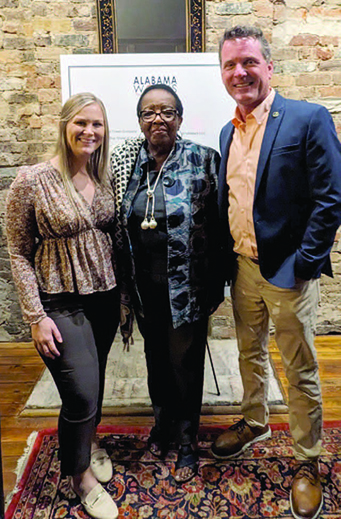 Amanda Vickers, Rep. Laura Hall, Bobby Giles
Amanda Vickers, Rep. Laura Hall, Bobby Giles
APA’s mission is to promote, defend and expand the profession and its essential role in patient care. As director of government affairs, Giles advocates for the profession of pharmacy through the legislative process and is responsible for cultivating relationships with elected officials, reviewing all legislation related to pharmacy, drafting bills related to pharmacy practice and lobbying and educating elected officials.
“APA is working for the profession while students and pharmacists are working in it,” said Giles. “You do not have to be an elected official to make a difference.”
During the five-week experience, students learn about the importance of professional advocacy, the legislative process, communicating with elected officials, member engagement, state professional association administration and current pharmacy issues and challenges. Students spend time at the Alabama State House actively engaging with state legislators in several ways, including attending committee meetings, observing Senate and House debates and contributing to open discussions about legislation.
A firsthand experience of the day-to-day activities of a lobbyist or advocate, students also work on various research projects related to upcoming bills, talking points, counterarguments and vital economic statistics related to pharmacy. Students also interact with other state and federal organizations such as the Alabama Department of Public Health, Alabama Board of Pharmacy, National Community Pharmacists Association and the American Pharmacists Association, just to name a few.
“I saw how deeply impacted our field is by legislation and how important it is to advocate for our profession for us to be able to provide the best patient care possible,” said Peacock. “I think this experience is extremely valuable for student pharmacists as it allows us to see the impact that advocacy has on our profession and the value that associations can provide in advocating on our behalf as we continue to practice on the front lines of patient care.”
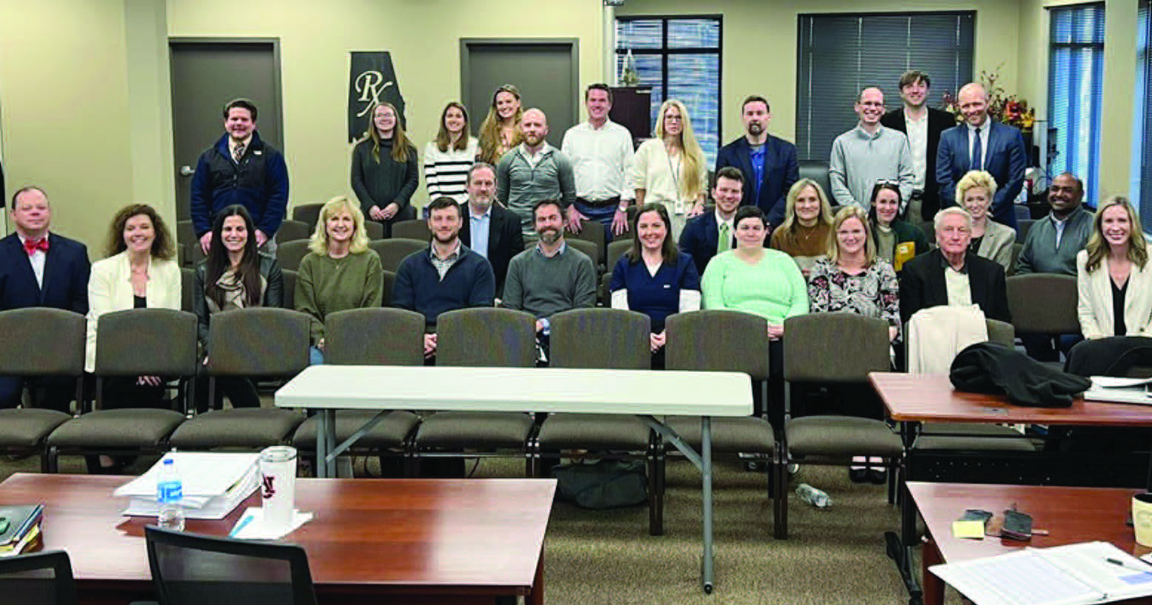 Alabama Board of Pharmacy workgroup-Amber Peacock, Bobby Giles (back row)
Alabama Board of Pharmacy workgroup-Amber Peacock, Bobby Giles (back row)
Art and science combine to create a mural that increases the importance of climate resiliency and a sustainable future at Auburn University. Four colleges and one school at Auburn University including the College of Sciences and Mathematics (COSAM), the College of Agriculture, the College of Forestry, Wildlife and Environment and the College of Liberal Arts and the Graduate School, collaboratively unveiled a new mural in the university’s newest dining facility, The Edge.
Professor Chandana Mitra from Auburn’s Department of Geosciences welcomed everyone to the event.
“This mural titled sustainABLE is a multi-disciplinary project, 100 percent conceptualized and painted by Auburn University’s graduate and undergraduate students,” said Mitra. “The one-year art mural project, the swansong of the NSF Research Traineeship program or NRT, the NRT Trainees worked together with artists to develop a plan to communicate the range of their scientific research about climate change risk and resilience and the essence of the NRT program through a visual medium.”
The team worked diligently with stakeholders throughout the university.
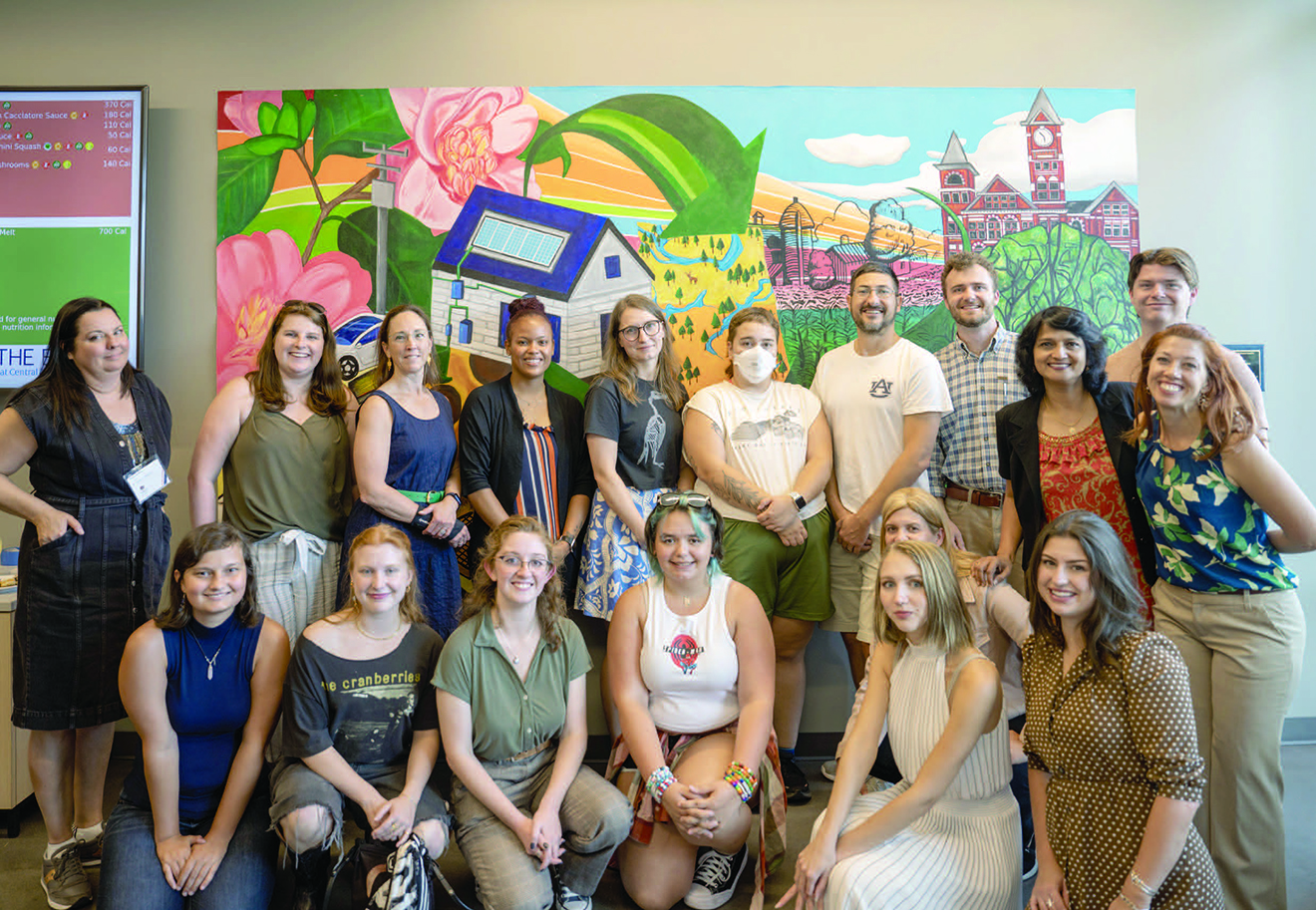 Faculty and students celebrate the completion of the mural
Faculty and students celebrate the completion of the mural
“We kicked off the initiative with a STEAM science communication workshop with our own Jule Collins Smith Museum of Fine Art,” said Mitra. “We also invited Dr. Mika Tosca, formerly a professor at the Chicago Institute of Art to lead a brainstorming workshop on how to communicate climate change through art designs. Each multidisciplinary NRT group created two to three concepts on the lines of sustainability at Auburn University, Alabama and beyond, trying to depict a positive future, a better world for the coming generations to live in. The sustainability and resiliency concepts were provided to professor Deschene who created the mural design. She then led art students in a mural painting class last spring to complete the mural. You can see the beautiful rendition of the scientific concepts into an art piece.”
These 21 students are part of the university’s National Science Foundation (NSF) Research Traineeship, or NRT. The five-year program has been funded through a $3 million NSF grant to develop multidisciplinary graduate students to understand better, predict and communicate the resilience of natural, social and built environmental systems.
“This project is an incredible unique opportunity for these students to share scientific concepts that the entire community can understand,” said Mitra. “This was Auburn University’s first NRT award and the very first in the state of Alabama to increase sustainability.”
NRT Fellow Kyle Lesinger, a fourth-year PhD student worked with the team to find the best ways to tell their story in a mural.
“In this NSF program, we developed a great cohort that was interdisciplinary in nature,” said Lesinger. “This mural project gave us an opportunity for professional and academic development through art and science communications.”
NRT Fellow Antrelle Clark, a fourth-year PhD student, worked on the dinosaur in the mural.
“I absolutely would not be where I am today without the NRT program,” Clark explained. “Through networking, I have built a community at Auburn.”
To learn more about the NRT mural, visit: www.youtube.com/watch?v=EgIq514N8ys
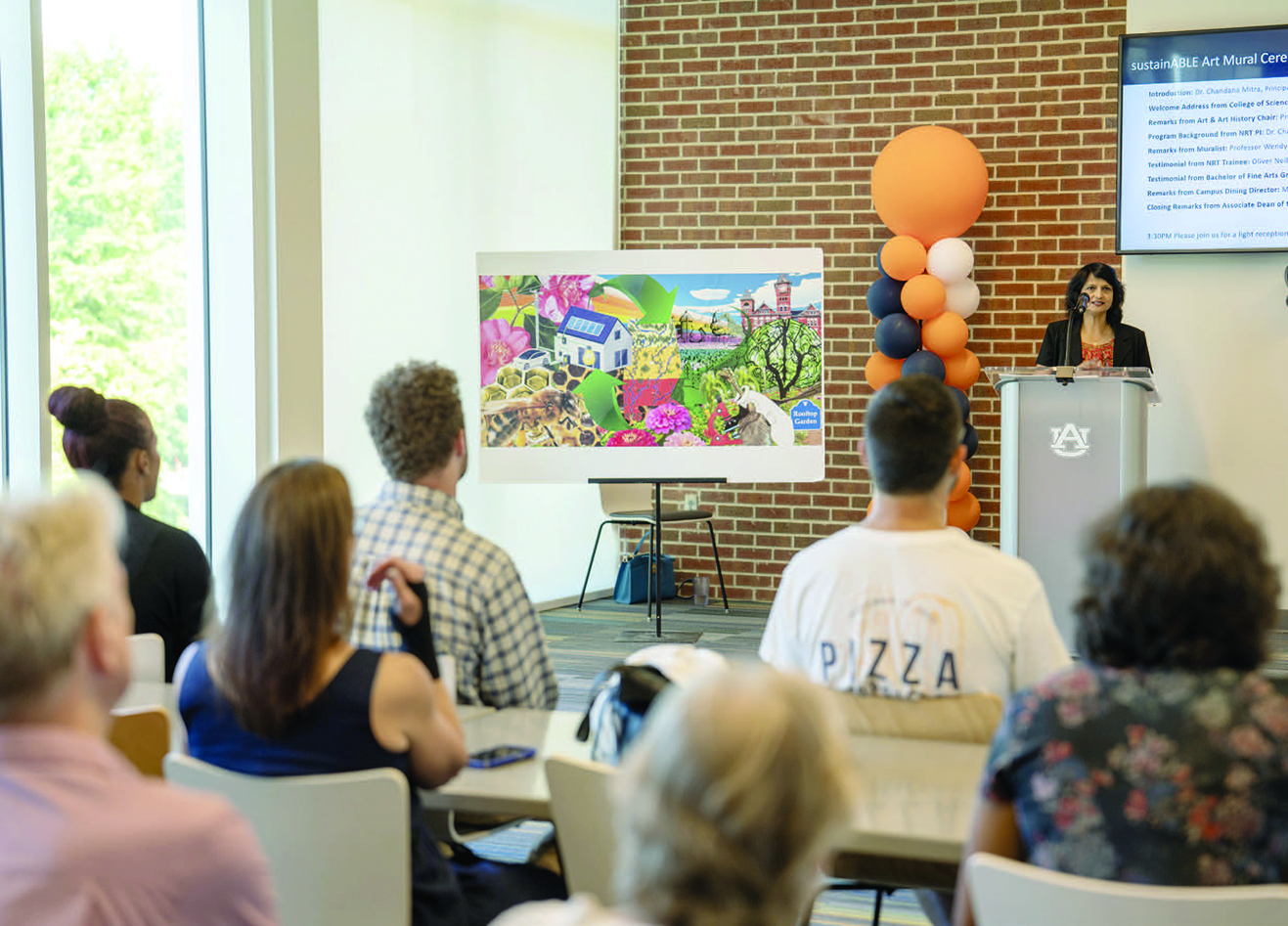
Recognizing Outstanding Commitment to Community Engagement
Dr. Royrickers Cook Endowed Engagement Award (RCEEA) nominees
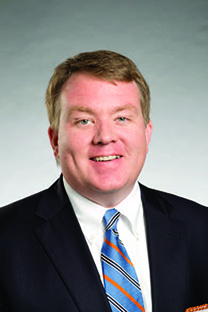
Jeremy L. Arthur, director of the Government and Economic Development Institute, has significantly impacted Alabama’s communities. His leadership in organizations like Main Street Alabama, Leadership Alabama and VOICES for Alabama’s Children highlights his dedication to civic engagement. Arthur’s work with VOICES has improved the lives of at-risk youth, while his contributions to Main Street Alabama have fostered public-private partnerships and community growth. He demonstrates an unwavering commitment to community service and development while continuing to improve the quality of life for Alabama residents.
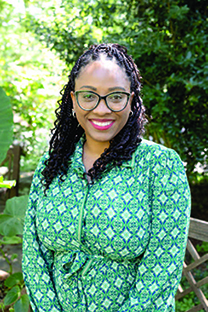
Portia Johnson, financial resource management extension specialist in the College of Human Sciences, has significantly contributed to community programming and financial education through her leadership and initiatives, particularly the Alabama FAST Program (FAFSA Application Survival Toolkit). Johnson has promoted financial literacy and increased access to higher education in her Extension role. Her creation of the Alabama FAST program has provided essential resources to thousands of families and high school students, significantly improving FAFSA completion rates across Alabama. Johnson’s dedication to continuous improvement and collaboration with key stakeholders has led to innovative programs that enhance educational opportunities. She demonstrates an unwavering commitment to empowering individuals and families through impactful outreach.
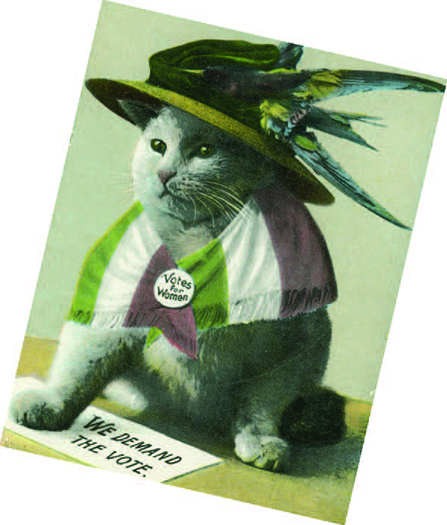
Hill article featured in Alabama magazine
An article written by Laura N. Hill, communications editor with the Encyclopedia of Alabama, was the featured story in the fall 2024 issue of Alabama Heritage. The piece, “The Tiniest Suffragette: A Kitten for Women’s Rights,” covers the forgotten tale of an Alabama kitten that became a national mascot for women’s suffrage in 1916 and traces the Alabama route of a transcontinental road trip, in a two-seater yellow roadster, promoting the cause. The article is Hill’s second one published by the award-winning quarterly print magazine that covers stories of Alabama’s history and culture.
The Office of Professional and Continuing Education (OPCE) welcomes several new employees
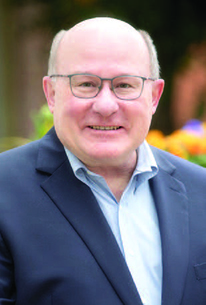
Emery Tschetter joined the office as an outreach program administrator. Tschetter is a leader in communications, marketing and educational program development with extensive experience in instructional design, distance education and project management.
For more than 20 years, he led Extension communications offices at Auburn University and South Dakota State University. He has worked in television and radio news and has broad experience in web and digital media development, grant writing, strategic planning, budgeting, branding, publishing and teaching. He holds bachelor’s and master’s degrees in journalism.
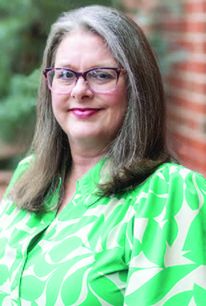
Jennifer Royal came to OPCE as an administrative support associate in April of 2024, after working for the Autauga County Board of Education for 18 years. Royal attended Auburn University at Montgomery and is the proud mother of two boys, Hunner and Taylor. Hunner is an Auburn University graduate in building science, and Taylor is currently a student majoring in auto mechanics at Trenholm State Community College.
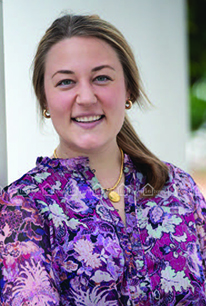
Kayla Fichtner earned her bachelor’s degree in psychology from Auburn University in 2019. She started with OPCE in January of 2024 in her role as a program developer, primarily overseeing community courses, but she also plays a role in OPCE’s military programs. Prior to her position at Auburn University, Kayla owned a small organizing business.
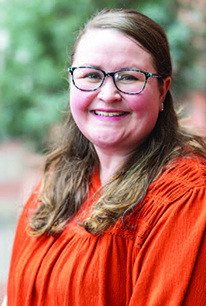
Brittney Wimberly joined OPCE as a program administrator in the fall of 2023. She received her bachelor’s degree in management from Auburn University. Before joining OPCE, Wimberly was a coordinator at an Association Management Company, handling event planning, membership, fundraising, communications and marketing for non-profit organizations.
Alabama governor declares National GEAR UP Week in the state
Gaining Early Awareness and Readiness for Undergraduate Programs (GEAR UP) Achieve at Auburn University is poised to increase awareness of its mission to help Alabama students succeed in gaining greater access to postsecondary education during National GEAR UP Week.
Through a collaborative effort with University of Montevallo’s GEAR UP Jefferson County and Alabama State University GEAR UP, on September 19 Alabama Governor Kay Ivey signed a proclamation declaring National GEAR UP Week in the State of Alabama for the week of September 23-27, 2024. The proclamation recognized the efforts the three programs have undertaken to serve 16,500 students across the state on their unique postsecondary education journeys.
“GEAR UP is such a valuable federal program and makes a real difference in the lives of the students we serve,” said Annette Scogin, director of GEAR UP Achieve at Auburn University. “We’re honored to receive Gov. Ivey’s proclamation in recognition of the impact of GEAR UP in our state and look forward to a continued partnership with our fellow GEAR UP programs and the State of Alabama.”
In its 25th year, National GEAR UP Week offers an opportunity for GEAR UP programs around the country to raise awareness in their communities about the positive impact of GEAR UP. In Alabama, attention on National GEAR UP Week has increased with the governor’s proclamation and recognition from elected officials at the state, regional and local levels.
In addition to Gov. Ivey’s proclamation, GEAR UP Achieve received a National GEAR UP Week resolution sponsored by Alabama House of Representatives Speaker Nathaniel Ledbetter. County commissions from Montgomery, Choctaw, Crenshaw, Elmore and Pike counties alongside Montgomery Mayor Steven Reed signed proclamations declaring National GEAR UP Week in their jurisdictions in recognition of the efforts of GEAR UP Achieve and as a commitment to providing a quality education for all students. Birmingham Mayor Randall Woodfin also offered a congratulatory letter recognizing the work that GEAR UP Achieve has undertaken to serve 8th-grade students in the Birmingham City School District. “GEAR UP Achieve is serving students in parts of our state where college and career readiness support is most needed,” said Anna-Margaret Goldman, director of Auburn’s Center for Educational Outreach and Engagement in University Outreach and a co-principal investigator for GEAR UP Achieve. “We hope the impact GEAR UP Achieve will have on the lives of these students will be felt for generations as postsecondary education becomes more and more accessible.”
Established in fall 2023 at Auburn University, GEAR UP Achieve is a seven-year grant that will follow a cohort of current 8th-grade students through their high school years and into their first year of postsecondary education to help ensure greater postsecondary access and success. Scholarships to accredited institutions of higher education will be available to students who complete the GEAR UP Achieve program.
“We’re privileged to serve the students of Alabama, positioning them in the best possible way to succeed after high school,” said Jason Bryant, director of the Auburn University College of Education’s Truman Pierce Institute and principal investigator of GEAR UP Achieve. “Whether their journey takes them to a four-year school, a state community college or an accredited trade school, our team will be there to provide guidance, mentorship and assistance each step of the way. It’s an honor to partner with our state and regional elected officials in these efforts.”

GEAR UP is a federally funded initiative designed to increase the number of students who are prepared to enter and succeed in postsecondary education. With a range of services offered, GEAR UP aims to support students, families and schools through access to rigorous coursework that prepares students for postsecondary success; assisting students in postsecondary preparation; advising students to support postsecondary aspirations; and increasing funding awareness and helping to navigate financial aid.
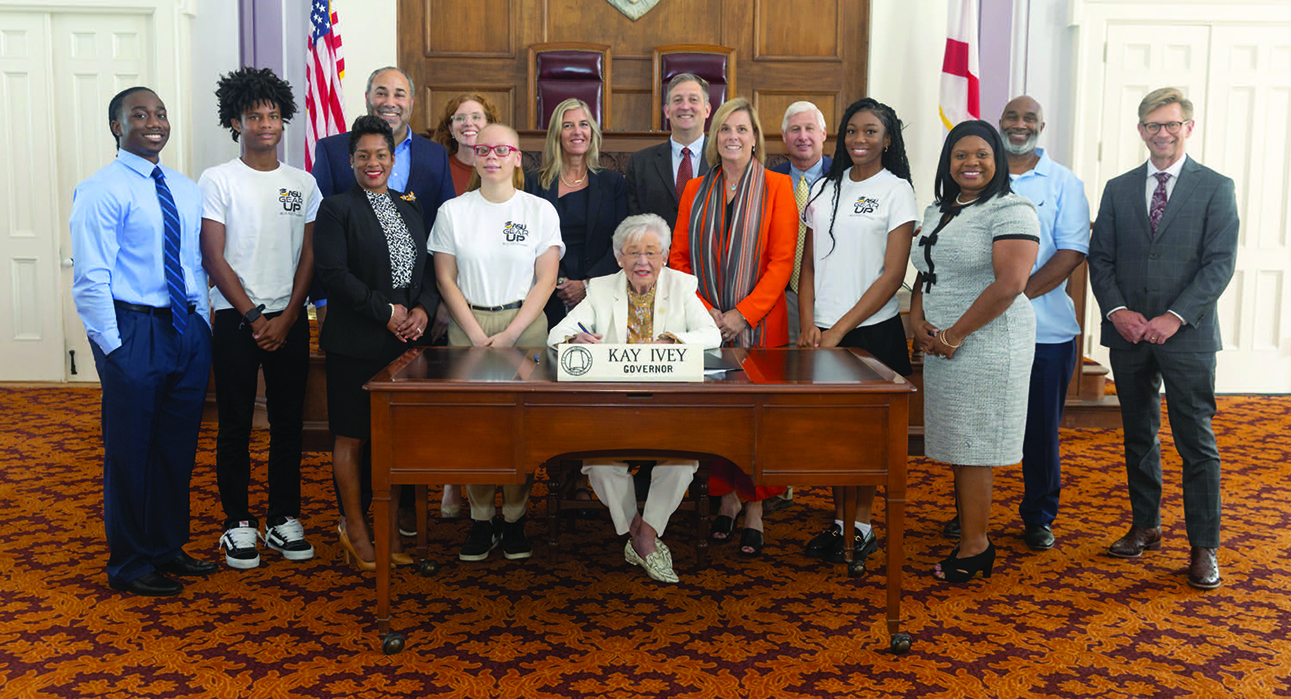
Draughon Center releases children’s book on an Auburn first family
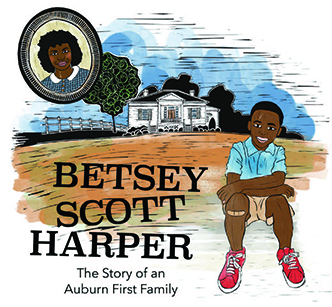
The Caroline Marshall Draughon Center for the Arts and Humanities in the College of Liberal Arts at Auburn University recently published an illustrated children’s book on the life of Betsey Scott Harper, written by descendant Terrance Vickerstaff and illustrated by Laura Murray.
Betsey Scott Harper was born around 1812 in Georgia and moved to Auburn in 1836 as an enslaved worker of Nathaniel J. Scott. The book recounts the stories Vickerstaff learned about his ancestors from his mother and grandmother. “Grandma Betsey” and other enslaved persons developed Scott’s plantation and built Pebble Hill, the historic Scott-Yarbrough House (1847), which remains in its original location on Debardeleben Street. Following emancipation, Betsey and Major Harper, an enslaved member of Judge John J. Harper’s plantation, were officially married at the Macon County Courthouse, and many of their descendants remain in Auburn today.
The Center and descendants will hold an event celebrating the book’s publication on February 1, 2025, at Pebble Hill. The book is available for purchase through the Caroline Marshall Draughon Center online at aub.ie/Betsey.
For more information on the book or February 1 event, contact Mark Wilson at 334-844-6198 or mwilson@auburn.edu.
The Center and descendants held an event celebrating the book’s publication on February 1, 2025, at Pebble Hill. The book is available for purchase through the Caroline Marshall Draughon Center online at aub.ie/Betsey.
For more information contact Mark Wilson at 334-844-6198 or mwilson@auburn.edu.
Campus and community friends are invited to use these interactive platforms to share their opportunities, projects and programs.
AuburnServes
The AuburnServes network functions as a repository for community partners to chronicle needs and offer volunteer opportunities to students.
Outreach Programs and Projects Network

Through this database, Auburn University faculty can share information about their Outreach programs and projects to facilitate further engagement, promotion and partnerships.
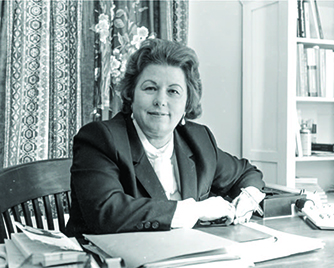 Leah Rawls Atkins, founding director of the Caroline Marshall Draughon Center for the Arts & Humanities. [Photo from AU Liberal Arts website]
Leah Rawls Atkins, founding director of the Caroline Marshall Draughon Center for the Arts & Humanities. [Photo from AU Liberal Arts website]
Leah Rawls Atkins, founding director of the Caroline Marshall Draughon Center for the Arts & Humanities, passed away in October at age 89. An Auburn alumna and first person to earn a doctorate in history from the university, Atkins’ extraordinary life leaves a legacy as a champion athlete, a renowned historian and author, and advocate for outreach scholarship.
A world champion water skier, Atkins was the first woman inducted into the Alabama Sports Hall of Fame, and today is the namesake for the Auburn University Leah Rawls Atkins Award given to exemplary female student-athletes. As a history scholar, Atkins taught at the University of Alabama-Birmingham, Samford University and Auburn, and she co-authored Alabama – The History of a Deep South State, which is considered one of the most comprehensive and essential Southern histories.
Atkins was also influential as an early advocate for outreach scholarship and community engagement. Returning to Auburn in 1985, Atkins founded the Center for the Arts & Humanities with the outreach mission at its heart. Since then, countless Alabamians have enjoyed and benefited from conferences, workshops and lifelong learning classes hosted at the center at Pebble Hill. In 1988, Leah Rawls Atkins became the first recipient of Auburn University’s Award for Excellence in Outreach, recognizing the impact of her work through the Center and its programs.
“Atkins’ energy, abilities and commitment to the people of Alabama is the reason the Caroline Marshall Draughon Center for the Arts & Humanities exists with a reputation of service around the state,” says current CMDCAH director Mark Wilson. “She believed in the land-grant mission of Auburn University, and she influenced everyone with whom she came into contact.”
Send your Outreach news, opportunities, projects and programs to outnews@auburn.edu or send us your email address to join the monthly newsletter mailing list!
The Outreach newsletter serves to provide our Auburn Family with ongoing updates regarding the tremendous outreach initiatives that are collaboratively launched between our unit and others across campus to impact citizens across Alabama and beyond. We are pleased to add this to our publication portfolio and hope this will inspire you to join us in making a difference!
Last Updated: April 2, 2025

